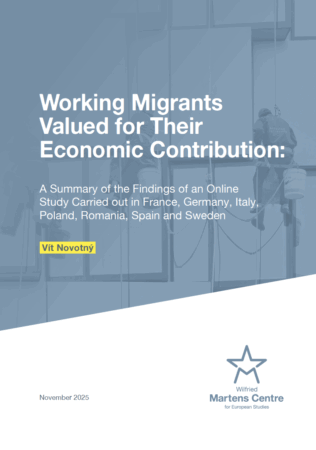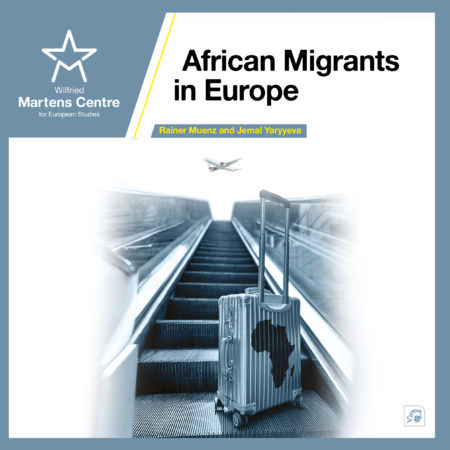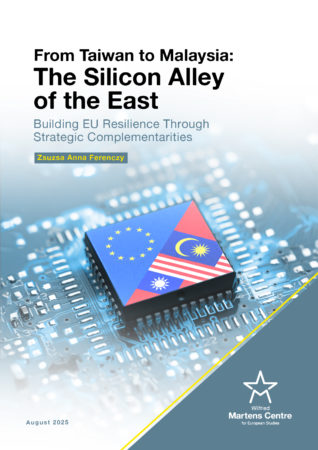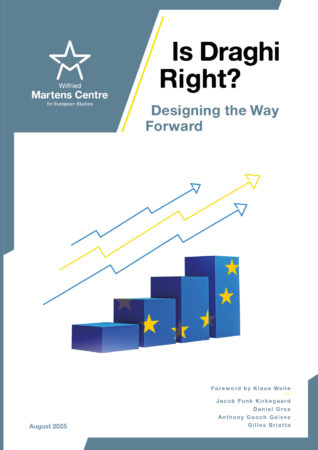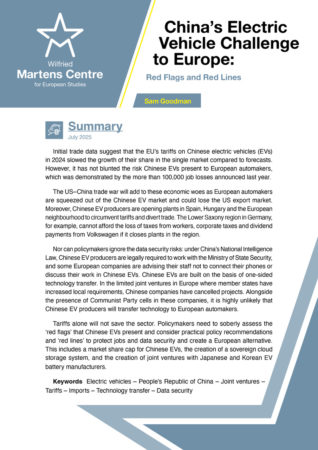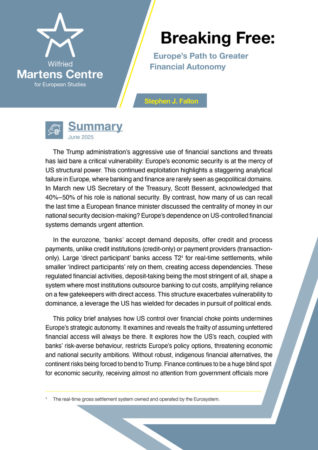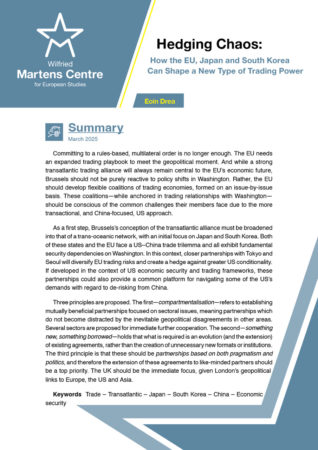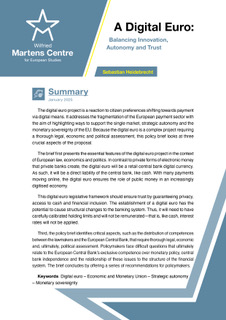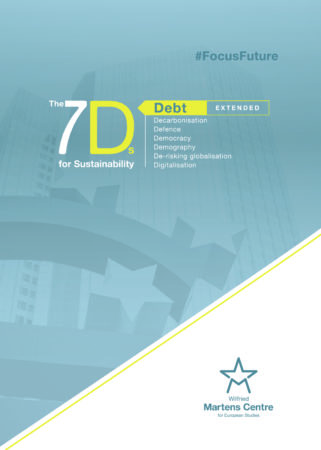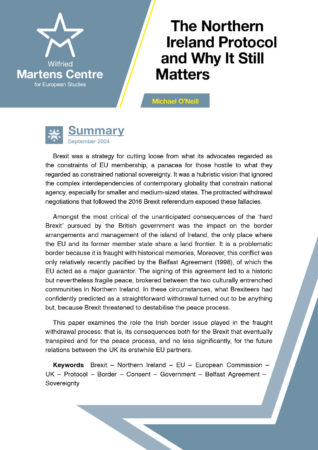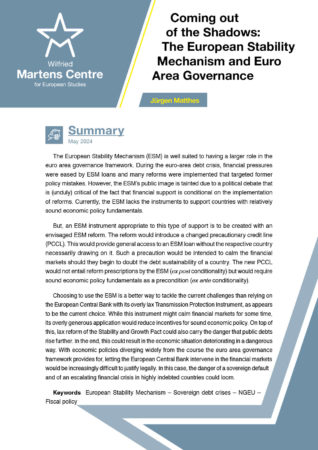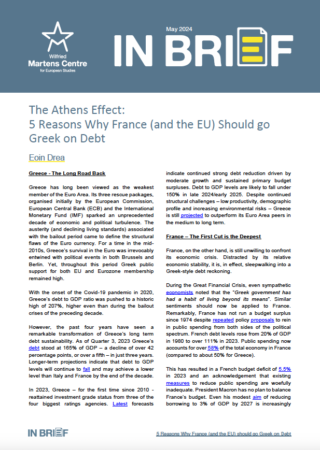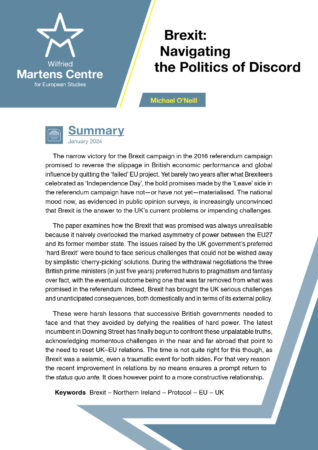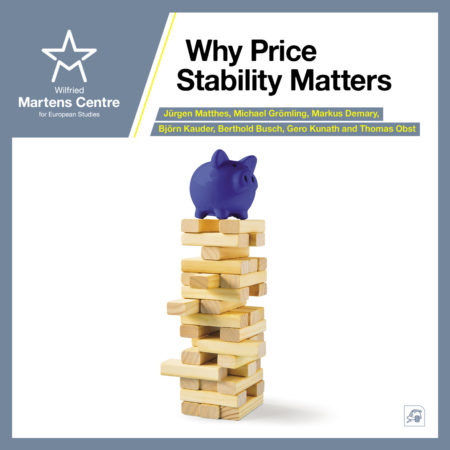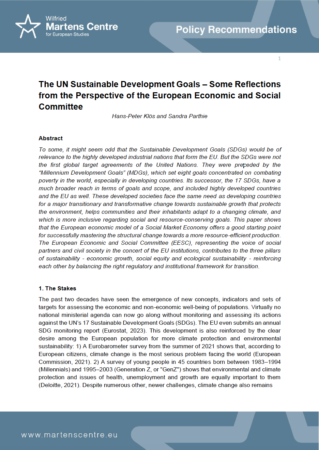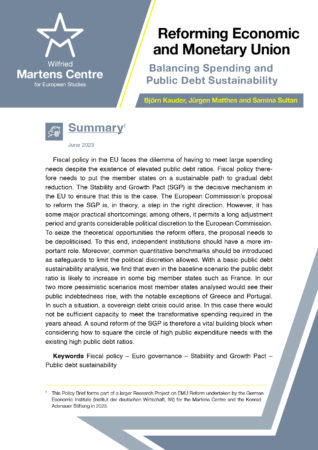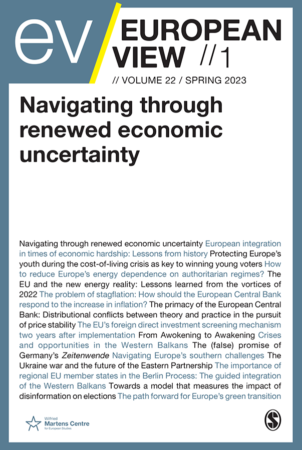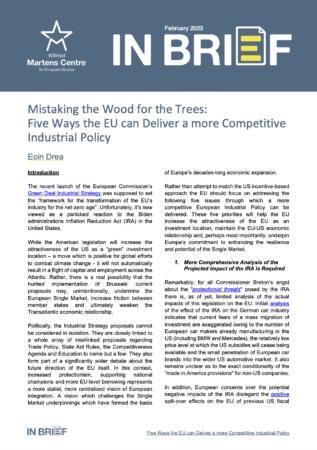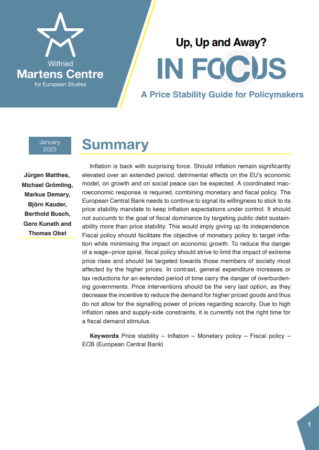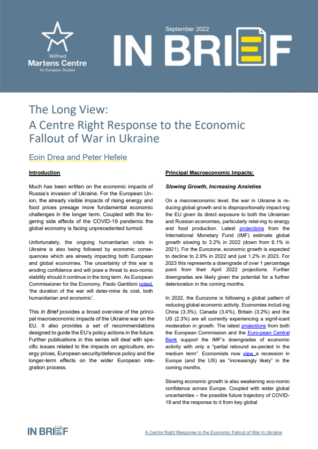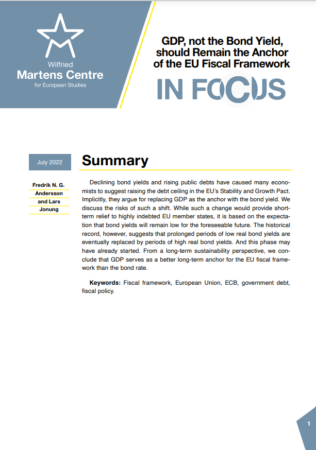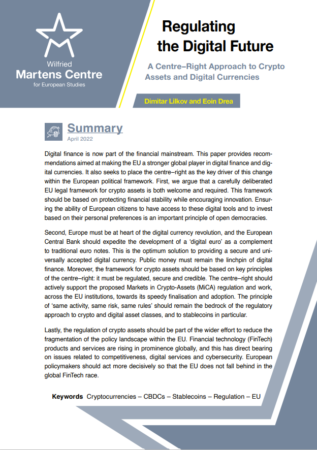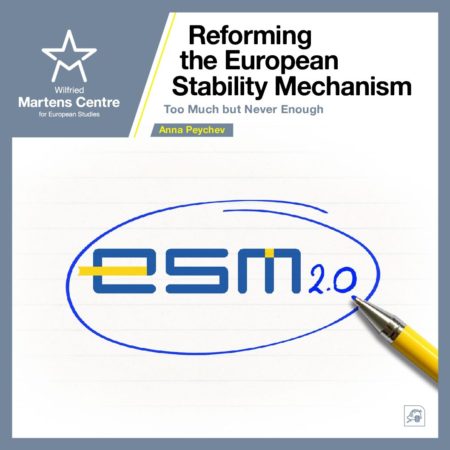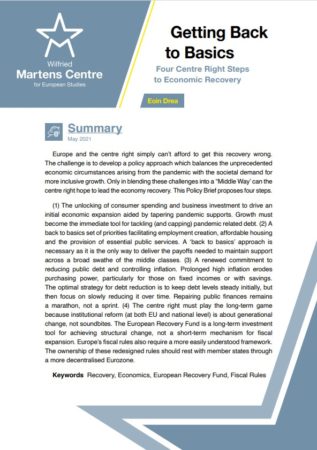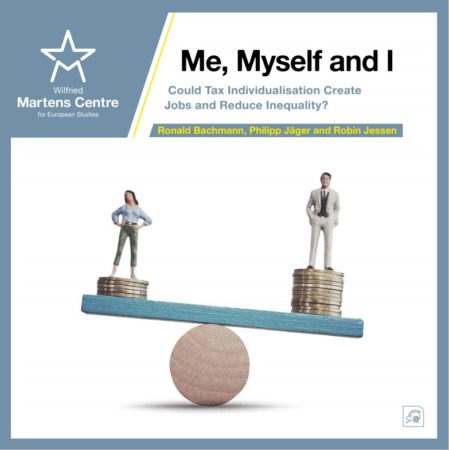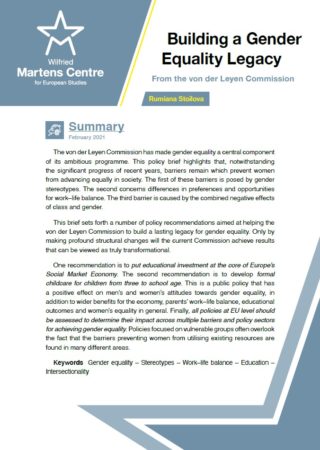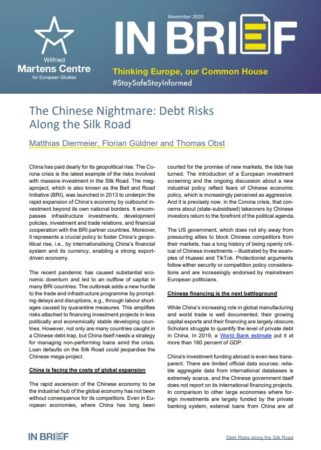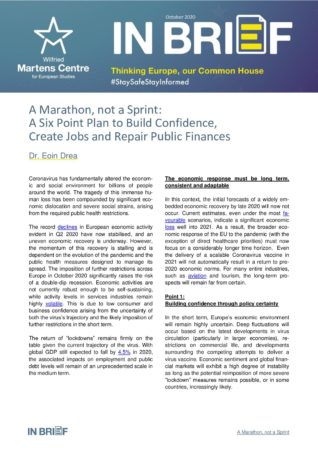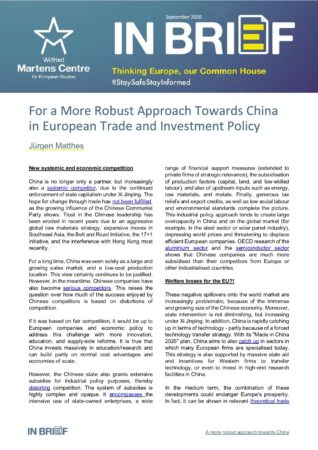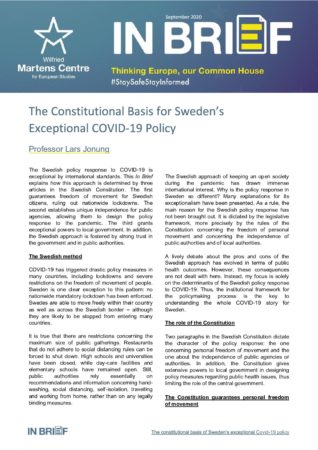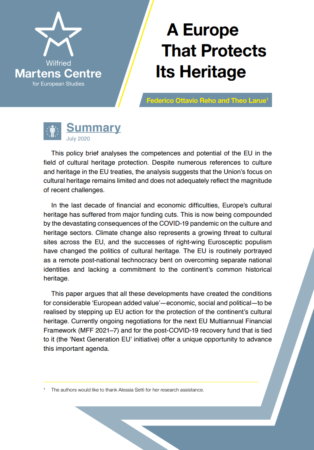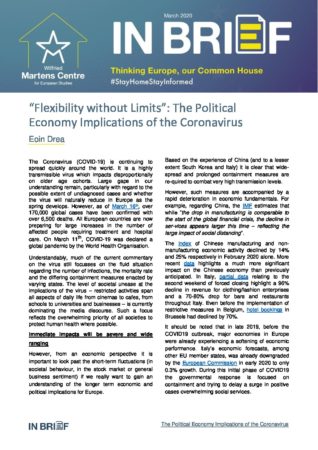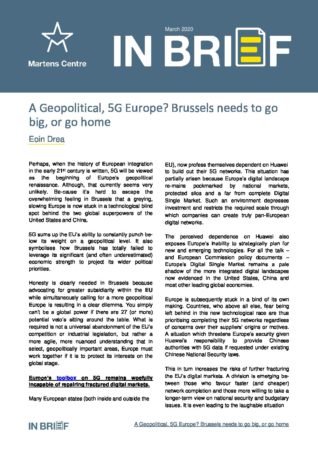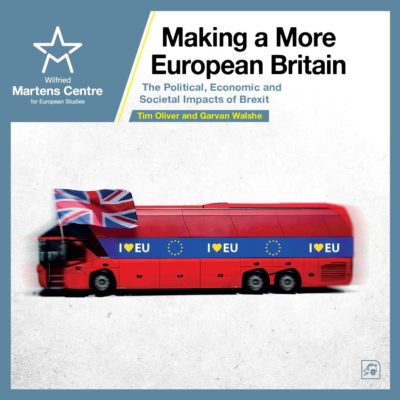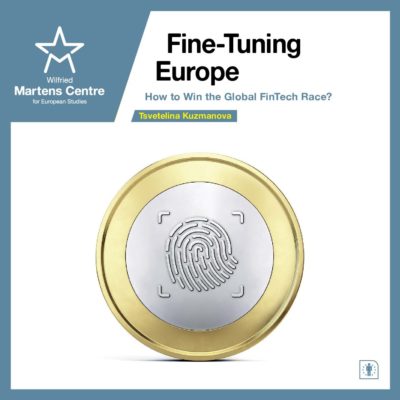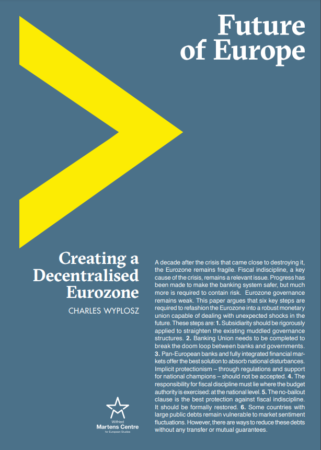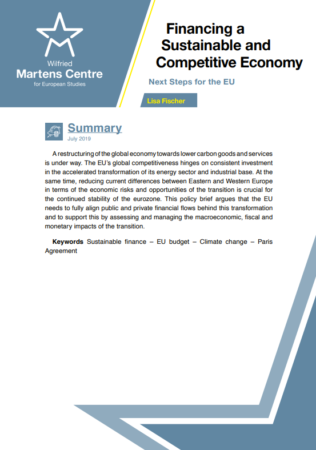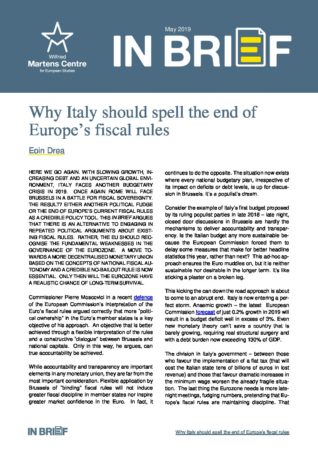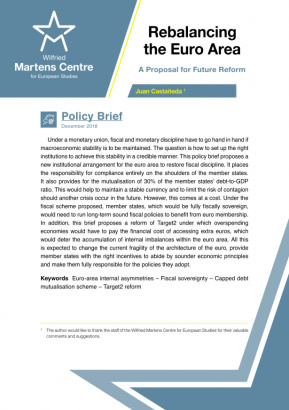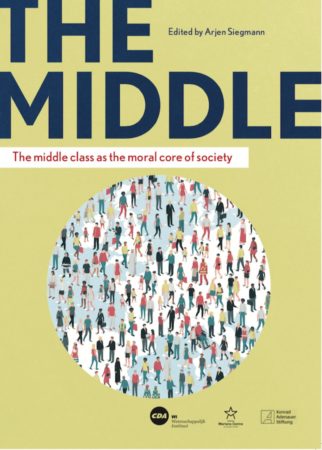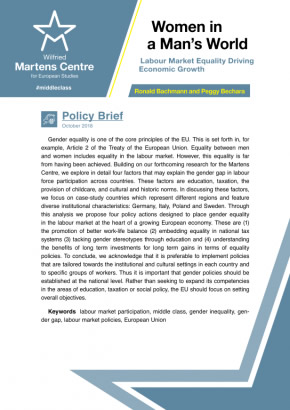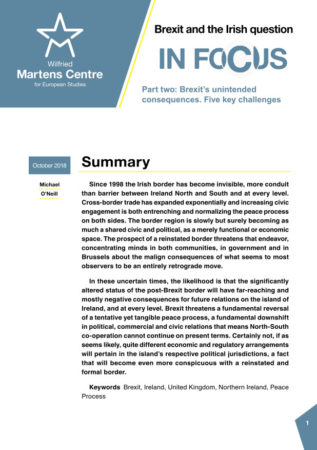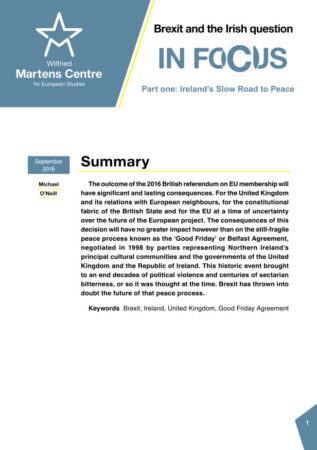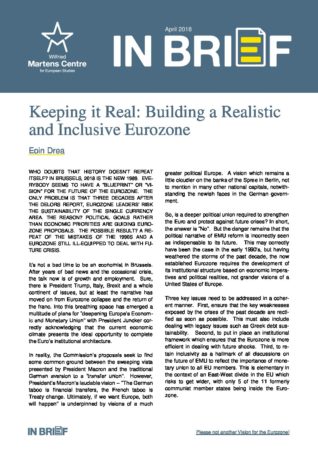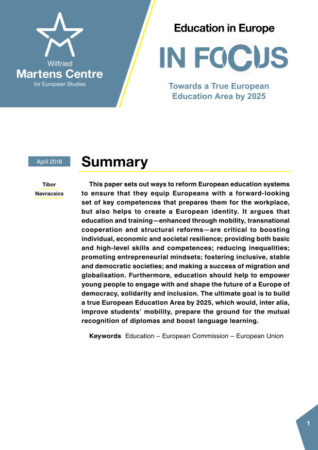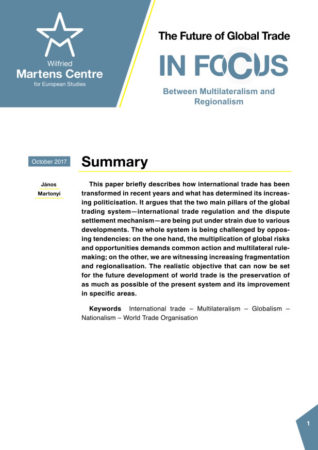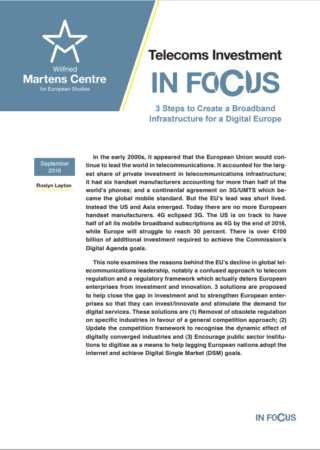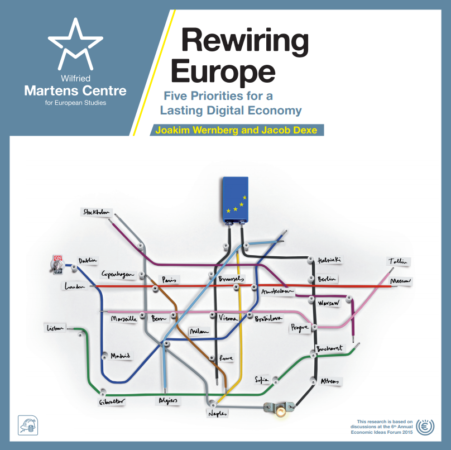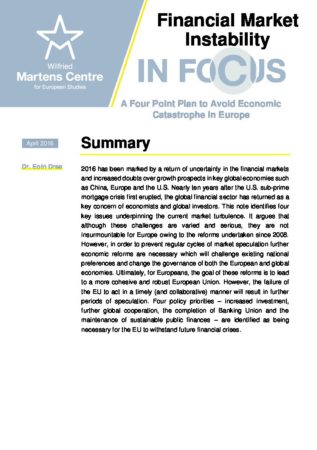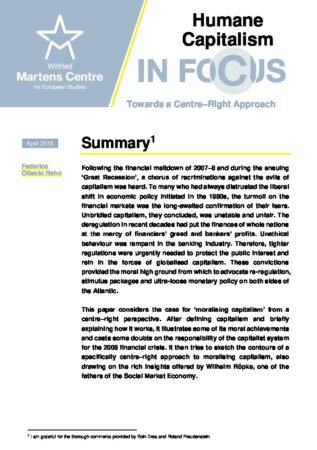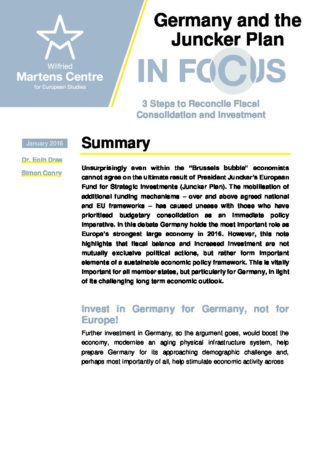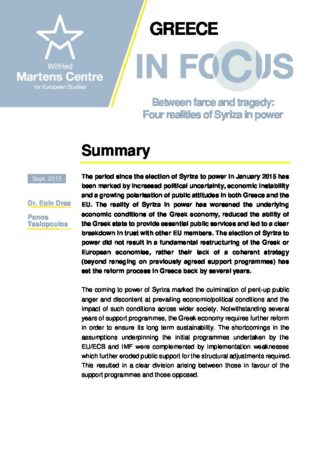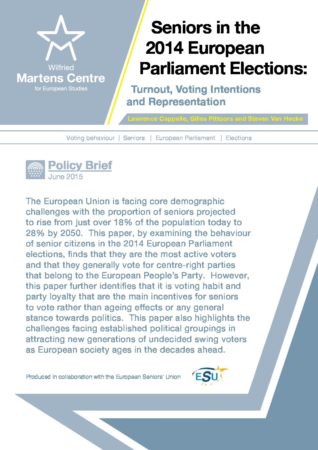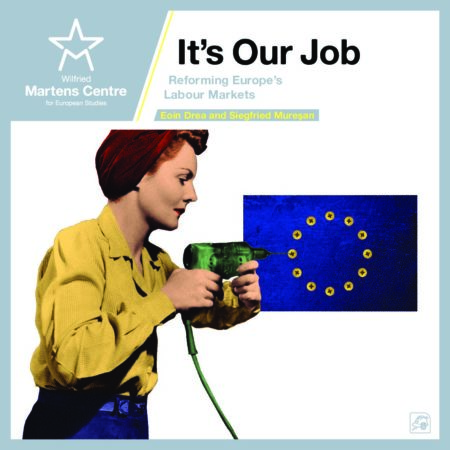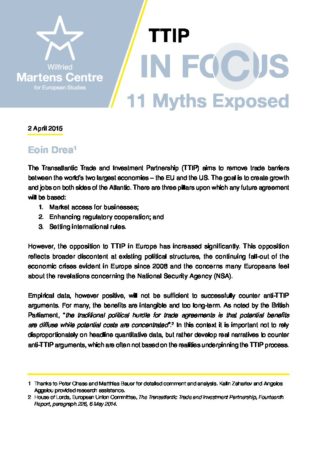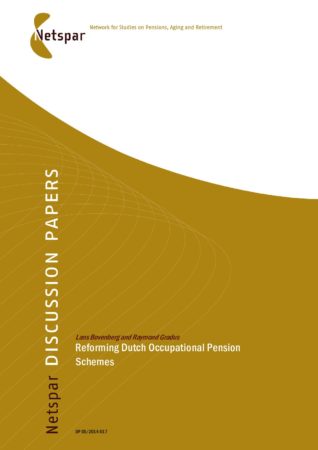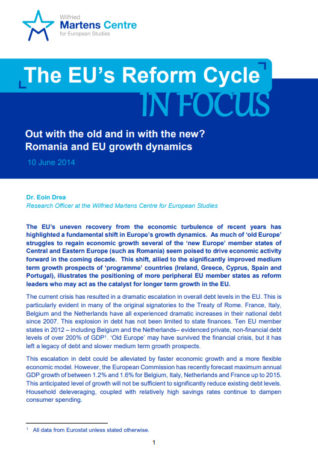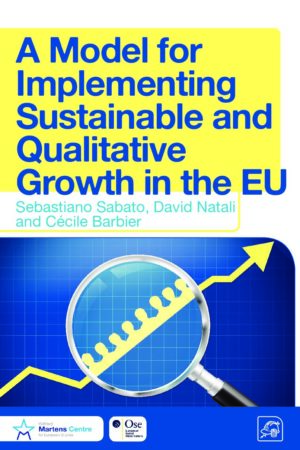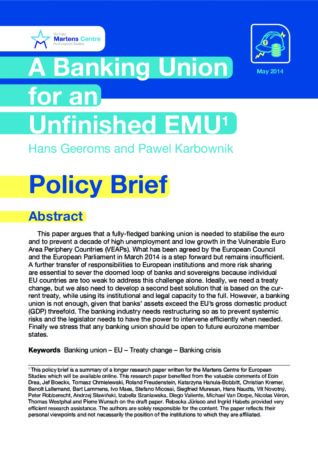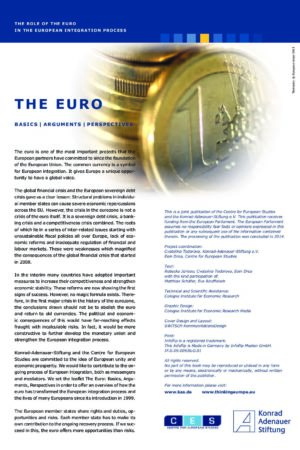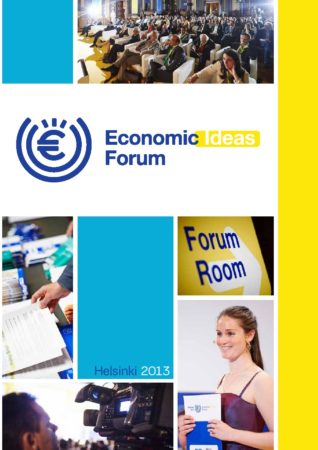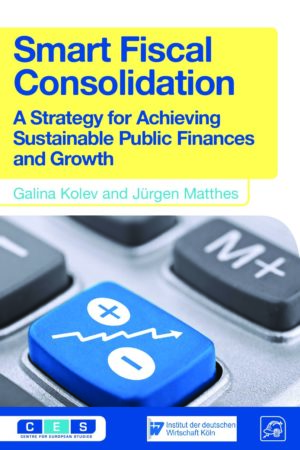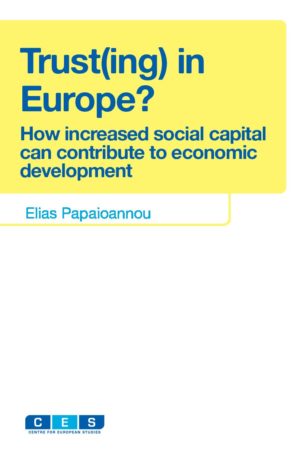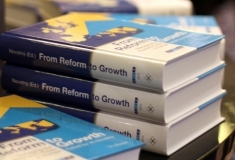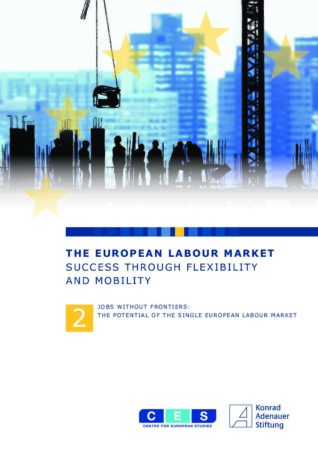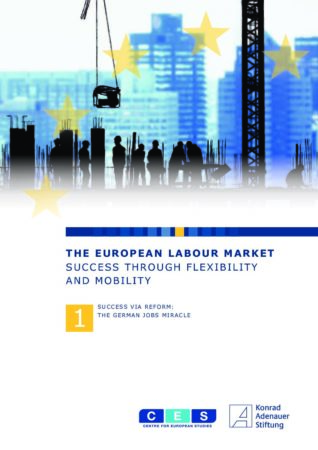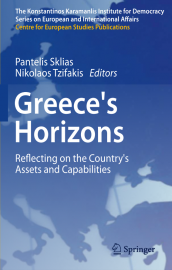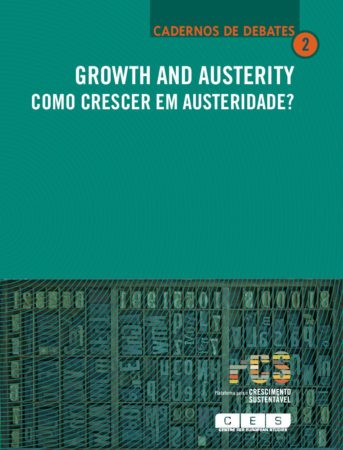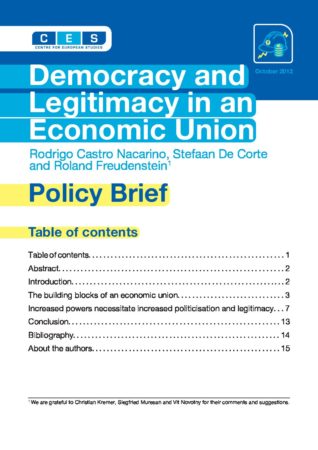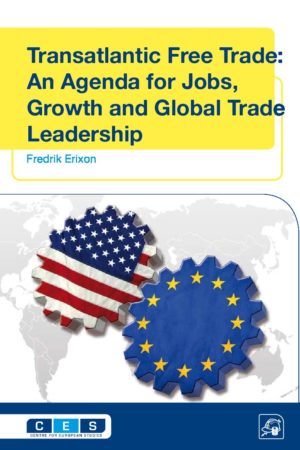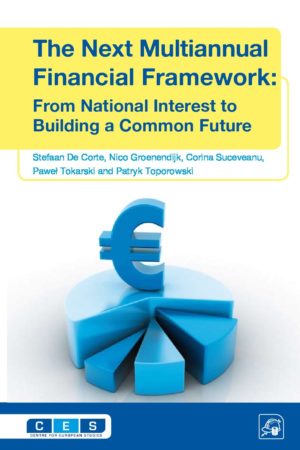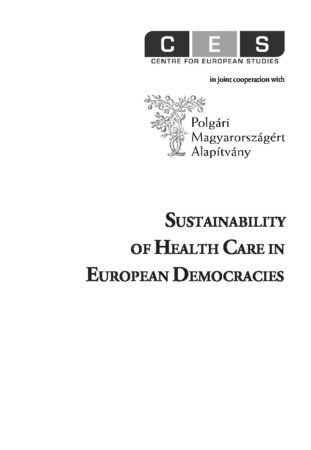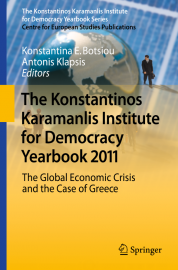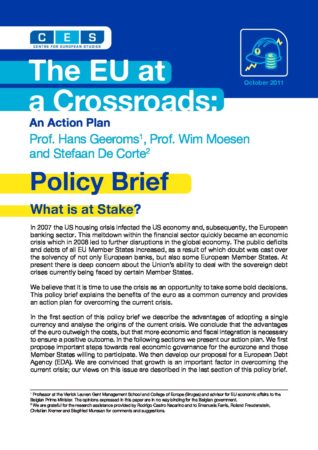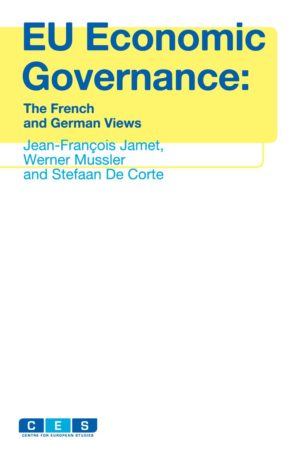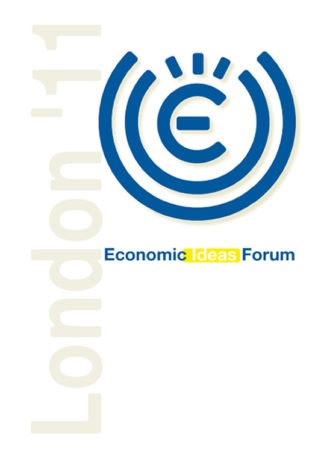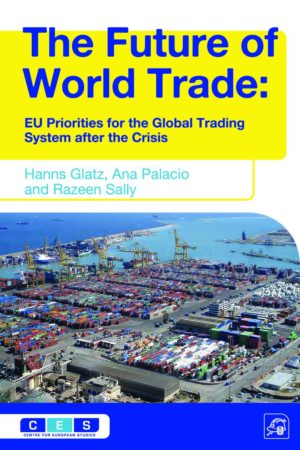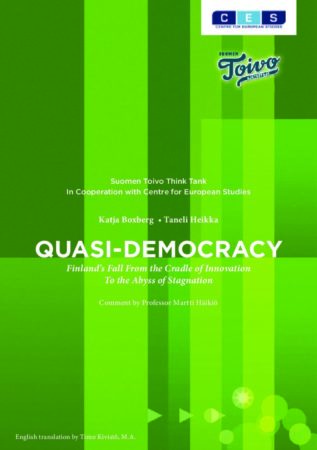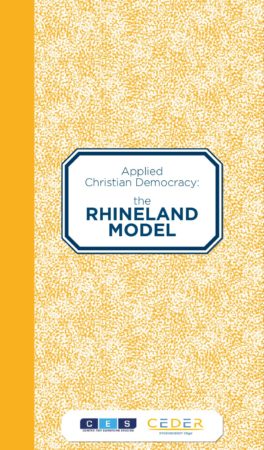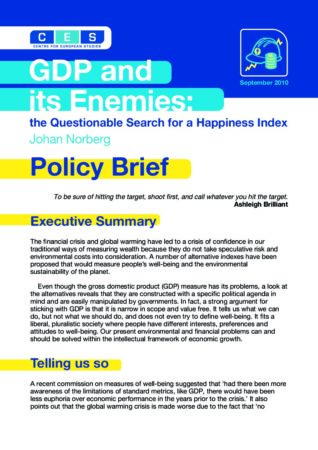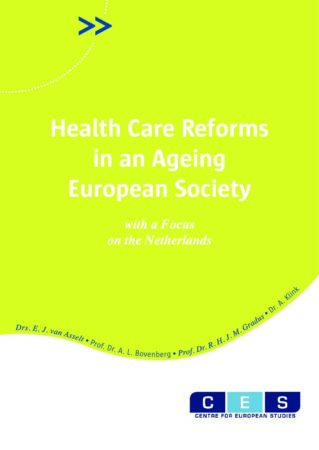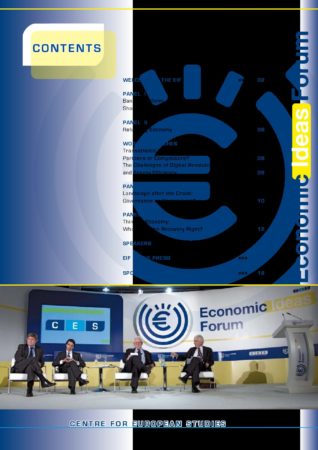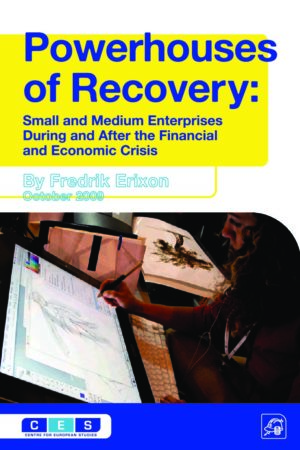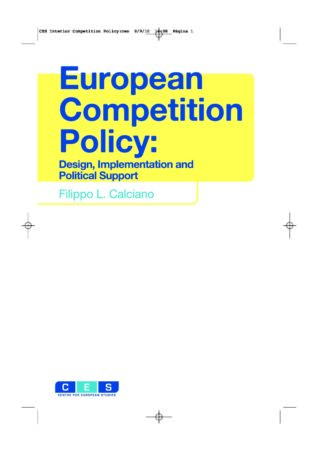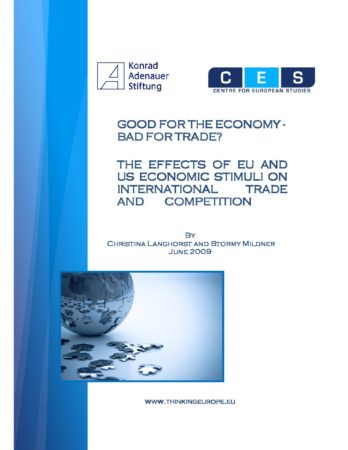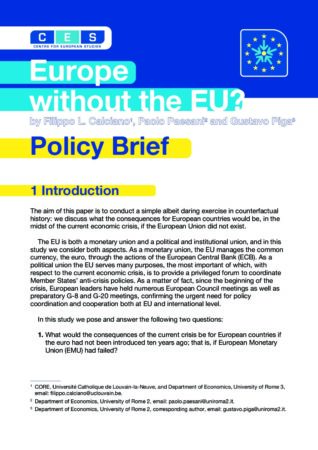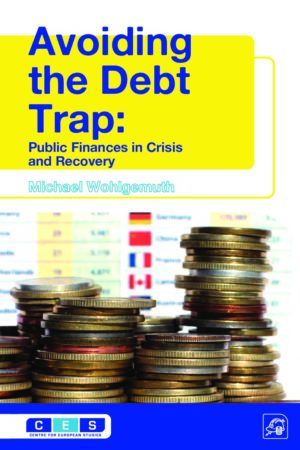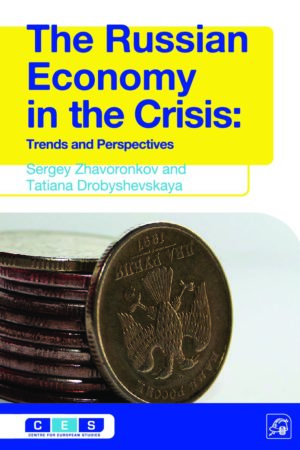-
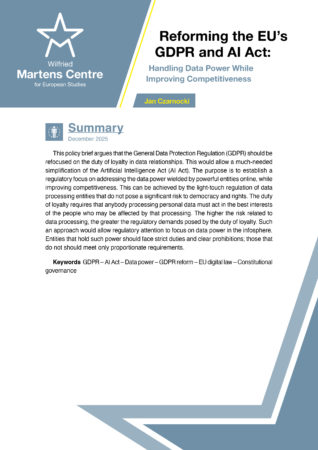
Policy Briefs
Reforming the EU’s GDPR and AI Act: Handling Data Power While Improving Competitiveness
-
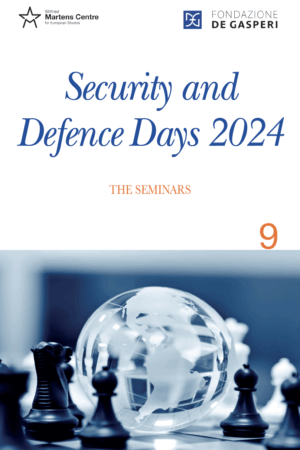
Collaborative
Security and Defence Days 2024
-
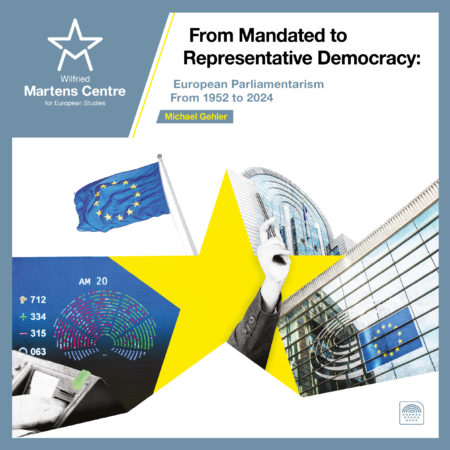
Research Papers
From Mandated to Representative Democracy: European Parliamentarism From 1952 to 2024
-
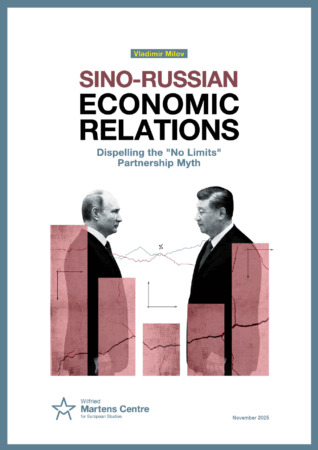
Other
Sino-Russian Economic Relations: Dispelling the “No Limits” Partnership Myth
-
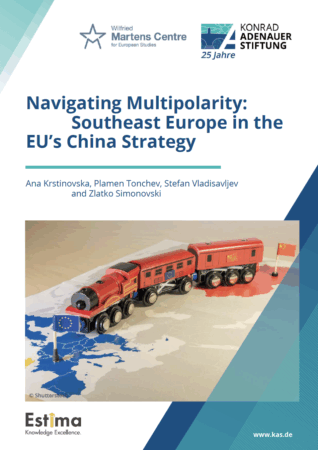
Collaborative
Navigating Multipolarity: Southeast Europe in the EU’s China Strategy
-
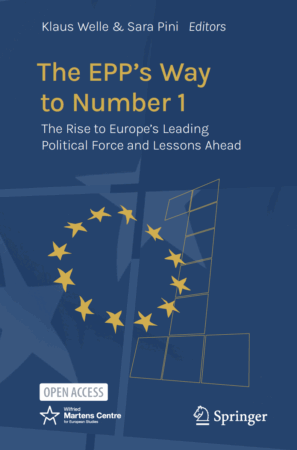
Other
The EPP’s Way to Number 1
-
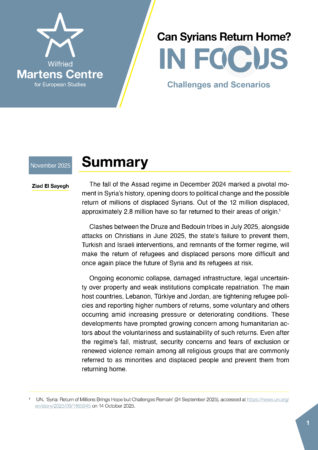
IN FOCUS
Can Syrians Return Home? Challenges and Scenarios
-
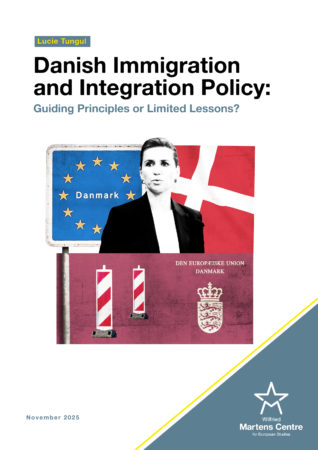
Other
Danish Immigration and Integration Policy: Guiding Principles or Limited Lessons?
-
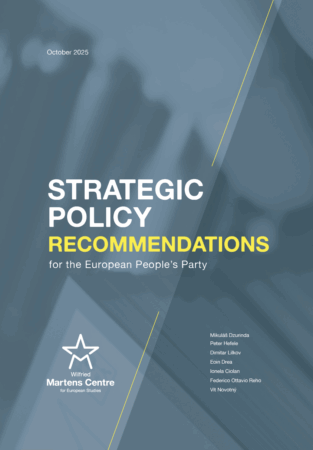
Other
Strategic Policy Recommendations for the European People’s Party
-
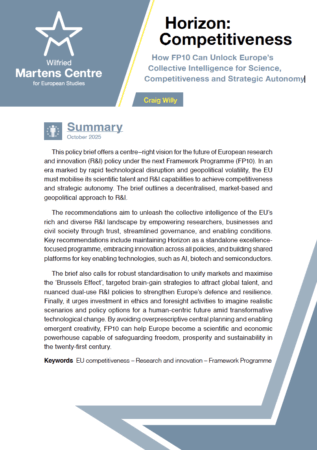
Policy Briefs
Horizon: Competitiveness – How FP10 Can Unlock Europe’s Collective Intelligence for Science, Competitiveness and Strategic Autonomy
-
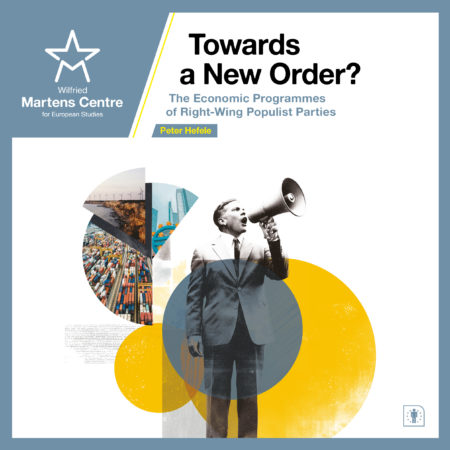
Research Papers
Towards a New Order? The Economic Programmes of Right-Wing Populist Parties
-
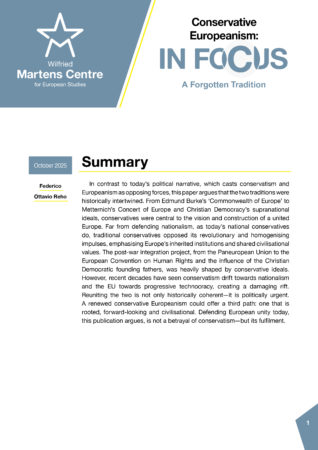
IN FOCUS
Conservative Europeanism: A Forgotten Tradition
-
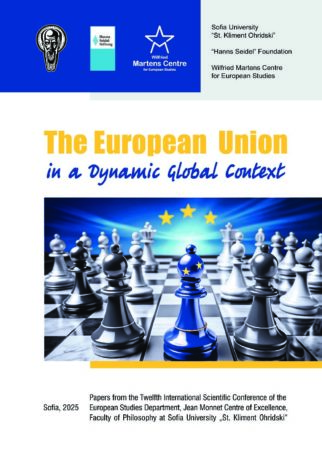
Collaborative
The European Union in a Dynamic Global Context
-
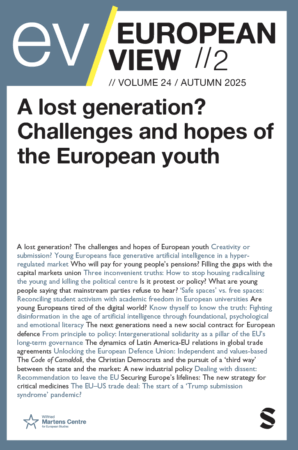
European View
A Lost Generation? The Challenges and Hopes of European Youth
-
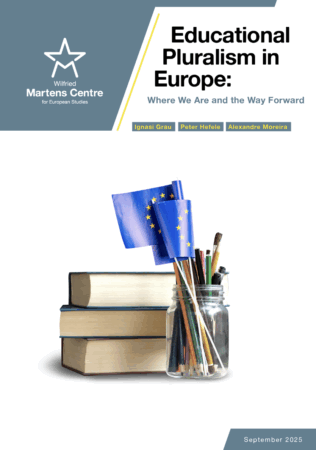
Other
Educational Pluralism in Europe: Where We Are and the Way Forward
-
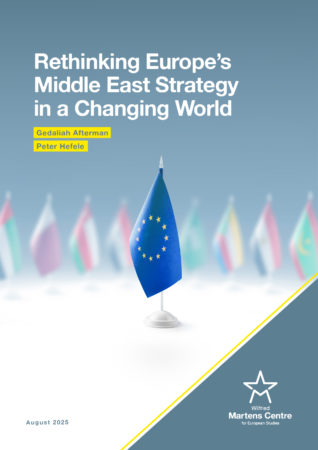
Other
Rethinking Europe’s Middle East Strategy in a Changing World
-

IN BRIEF
EU Development Aid and Migration: Clearing up Misconceptions
-

Ukraine
Securing Europe’s Critical Minerals: Leveraging the EU-Ukraine Partnership Amidst US Competition
-
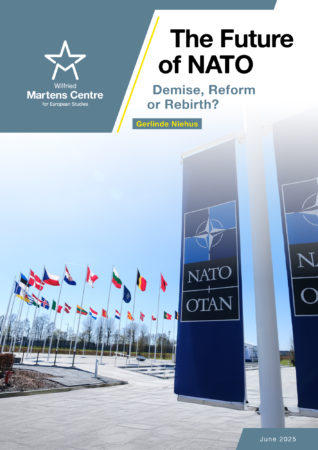
Other
The Future of NATO: Demise, Reform, or Rebirth?
-
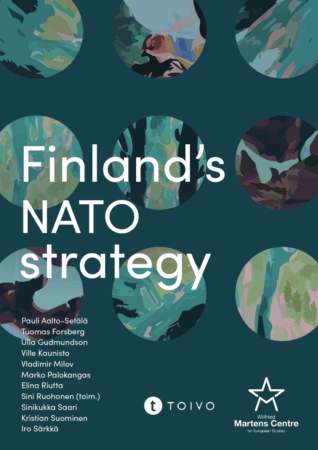
Collaborative
Finland’s NATO Strategy
-
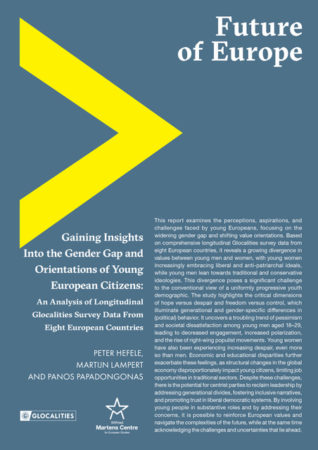
Future of Europe
Gaining Insights Into the Gender Gap and Orientations of Young European Citizens: An Analysis of Longitudinal Glocalities Survey Data From Eight European Countries
-
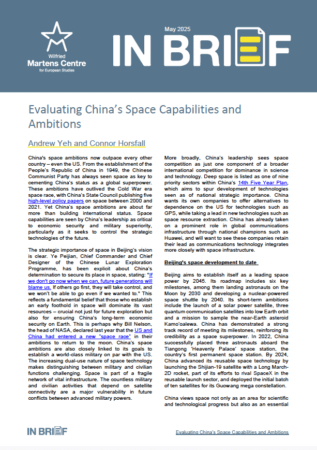
IN BRIEF
Evaluating China’s Space Capabilities and Ambitions
-
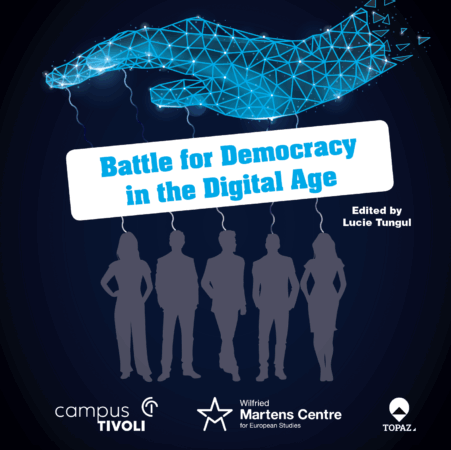
Collaborative
Battle for Democracy in the Digital Age
-
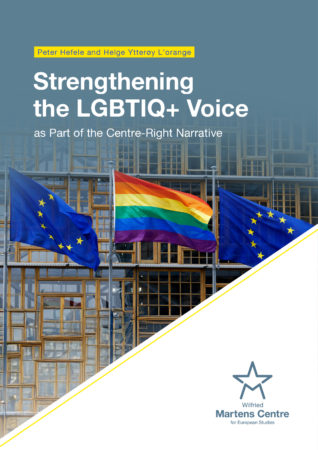
Other
Strengthening the LGBTIQ+ Voice As Part of the Centre-Right Narrative
-
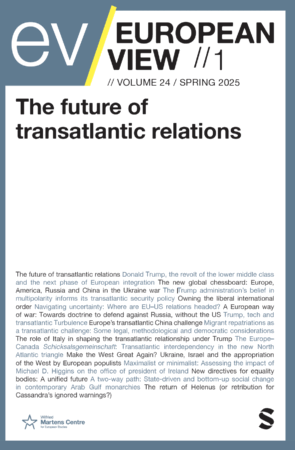
European View
The Future of Transatlantic Relations
-
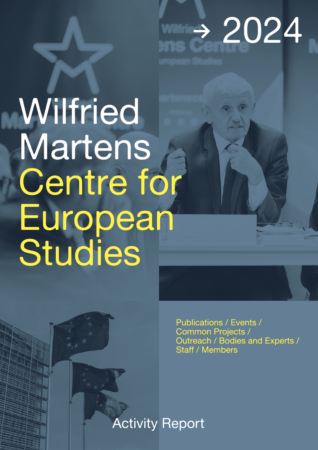
Activity Report
Activity Report 2024
-
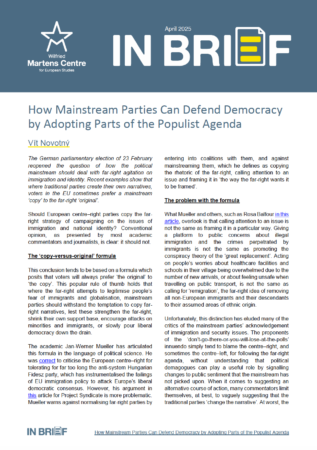
IN BRIEF
How Mainstream Parties Can Defend Democracy by Adopting Parts of the Populist Agenda
-
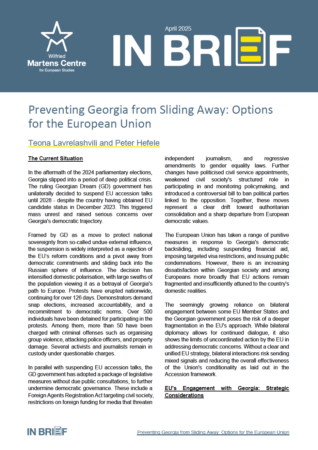
IN BRIEF
Preventing Georgia from Sliding Away: Options for the European Union
-
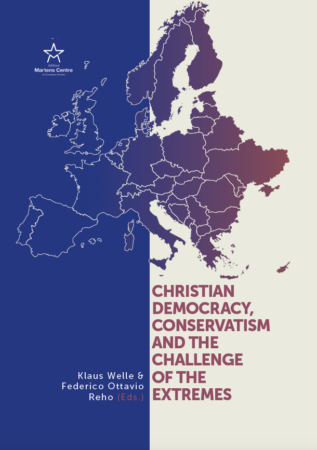
Other
Christian Democracy, Conservatism and the Challenge of the Extremes
-
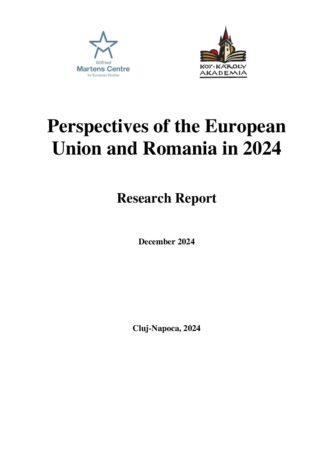
Collaborative
Perspectives of the European Union and Romania in 2024
-
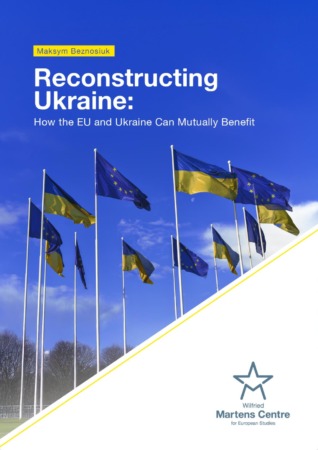
Ukraine
Reconstructing Ukraine: How the EU and Ukraine Can Mutually Benefit
-
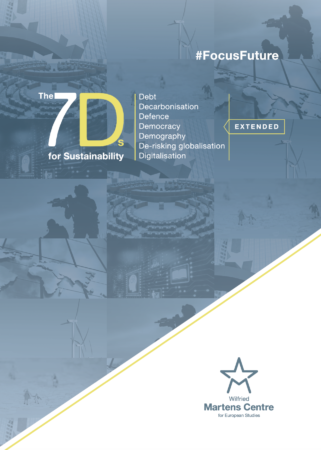
The 7Ds
The 7Ds Extended
-
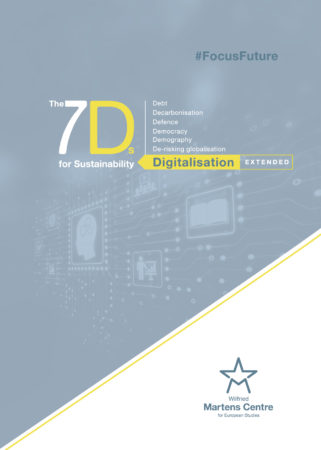
The 7Ds
The 7Ds – Digitalisation Extended
-
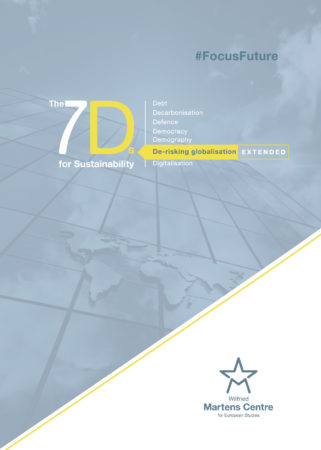
The 7Ds
The 7Ds – De-risking Globalisation Extended
-
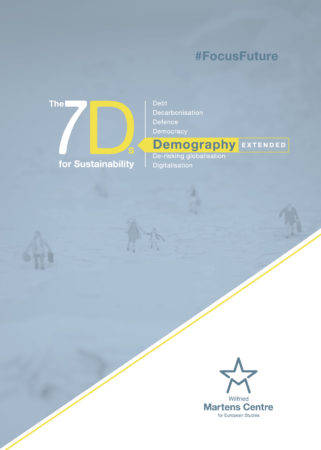
The 7Ds
The 7Ds – Demography Extended
-
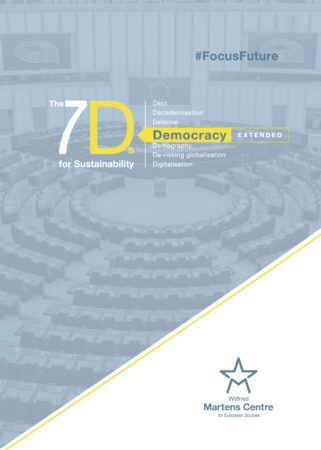
The 7Ds
The 7Ds – Democracy Extended
-
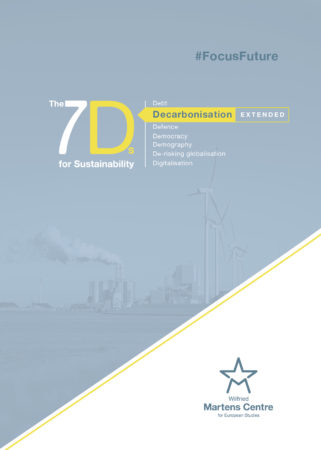
The 7Ds
The 7Ds – Decarbonisation Extended
-
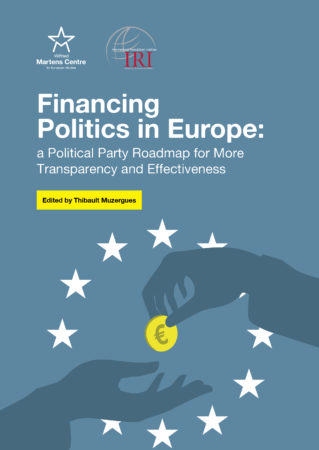
Collaborative
Financing Politics in Europe: a Political Party Roadmap for More Transparency and Effectiveness
-
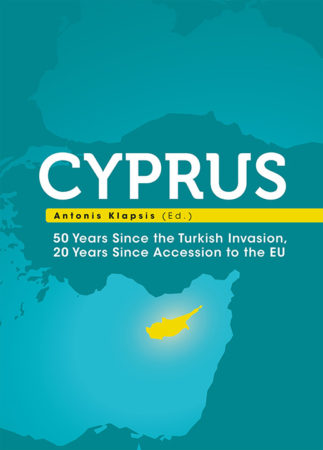
Collaborative
50 Years Since the Turkish Invasion, 20 Years Since Accession to the EU
-
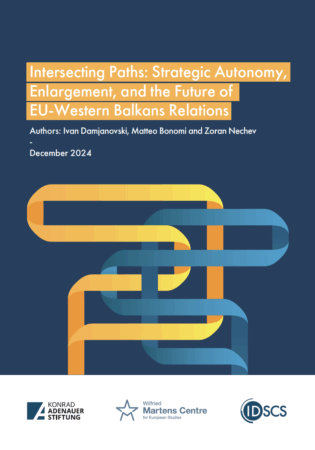
Collaborative
Intersecting Paths: Strategic Autonomy, Enlargement, and the Future of EU-Western Balkans Relations
-
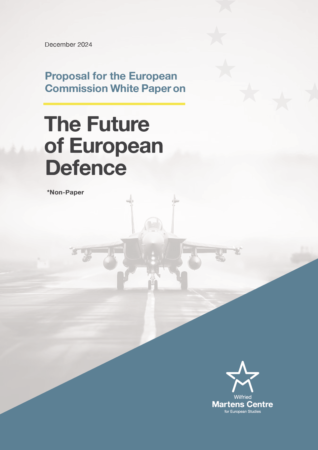
Other
Proposal for the European Commission White Paper on The Future of European Defence
-
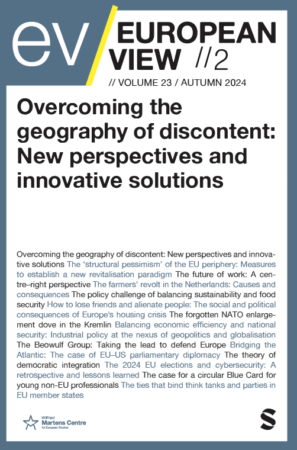
European View
Overcoming the geography of discontent: New perspectives and innovative solutions
-
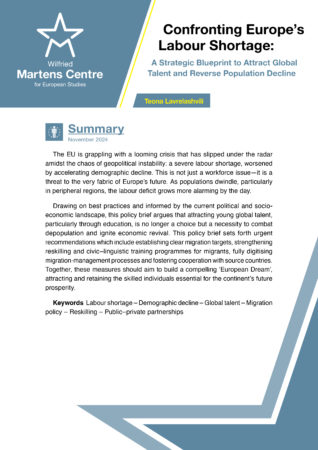
Policy Briefs
Confronting Europe’s Labour Shortage: A Strategic Blueprint to Attract Global Talent and Reverse Population Decline
-
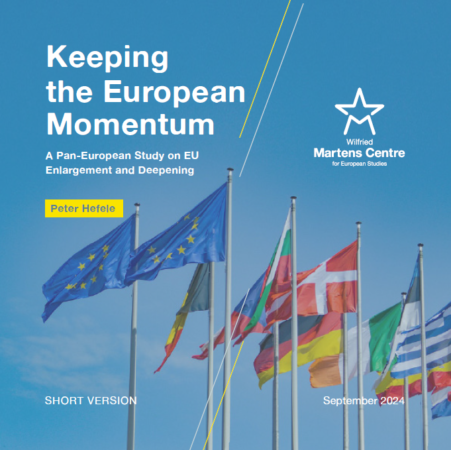
Other
Keeping the European Momentum: A Pan-European Study on EU Enlargement and Deepening
-
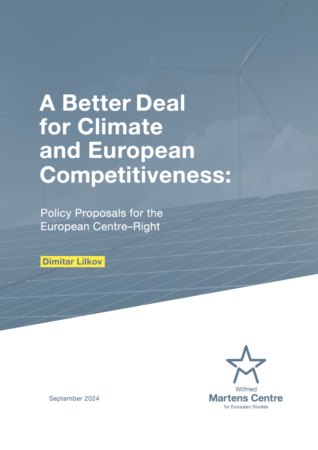
Other
A Better Deal for Climate and European Competitiveness: Policy Proposals for the European Centre–Right
-
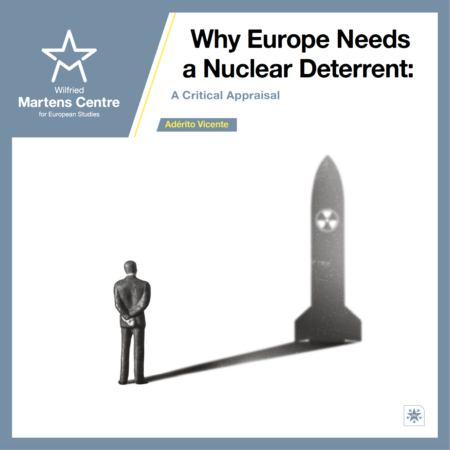
Research Papers
Why Europe Needs a Nuclear Deterrent: A Critical Appraisal
-
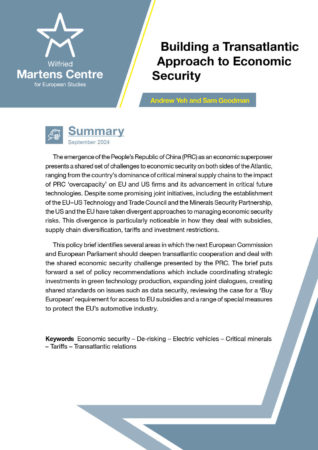
Policy Briefs
Building a Transatlantic Approach to Economic Security
-
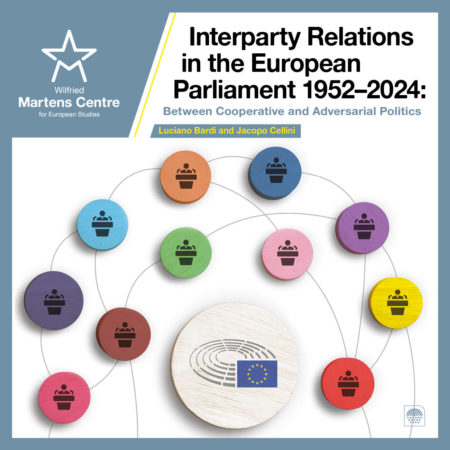
Research Papers
Interparty Relations in the European Parliament 1952–2024: Between Cooperative and Adversarial Politics
-
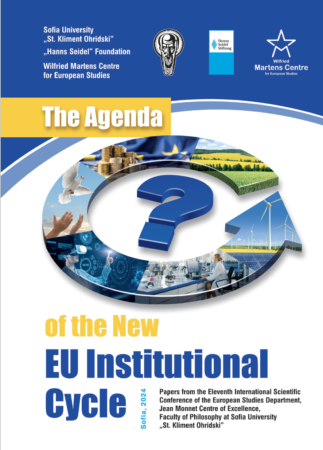
Collaborative
The Agenda of the New EU Institutional Cycle
-
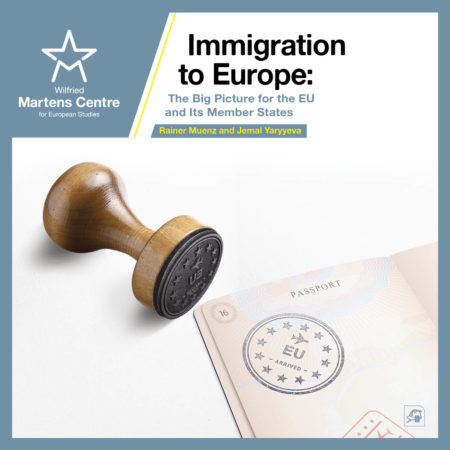
Research Papers
Immigration to Europe: The Big Picture for the EU and Its Member States
-

The 7Ds
The 7Ds – Defence Extended
-
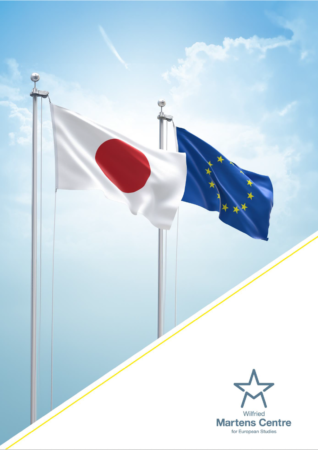
Other
Ambitions and Limits: The Deepening Security Dialogue Between Japan and the European Union
-
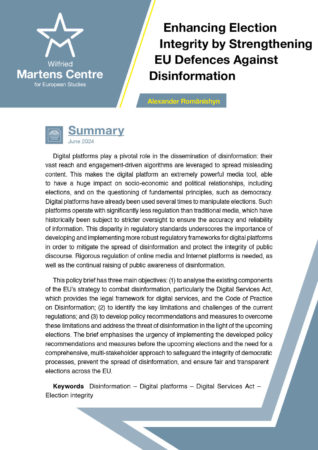
Policy Briefs
Enhancing Election Integrity by Strengthening EU Defences Against Disinformation
-
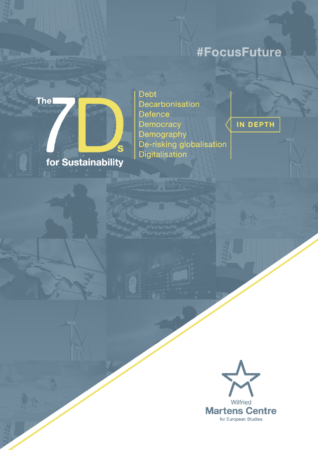
The 7Ds
The 7Ds In Depth
-
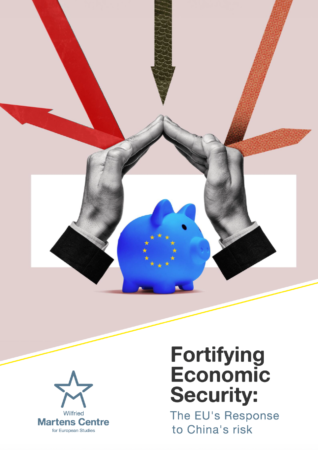
Other
Fortifying Economic Security: The EU’s Response to China’s Risk
-
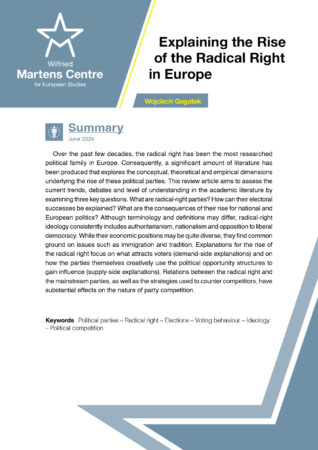
Policy Briefs
Explaining the Rise of the Radical Right in Europe
-
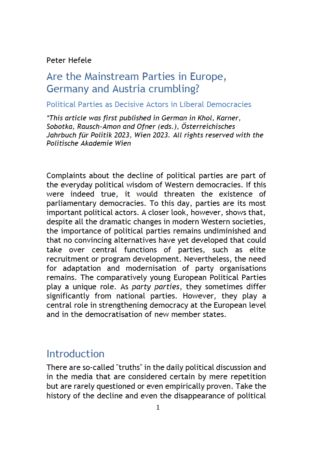
Collaborative
Are the Mainstream Parties in Europe, Germany and Austria crumbling? Political Parties as Decisive Actors in Liberal Democracies
-
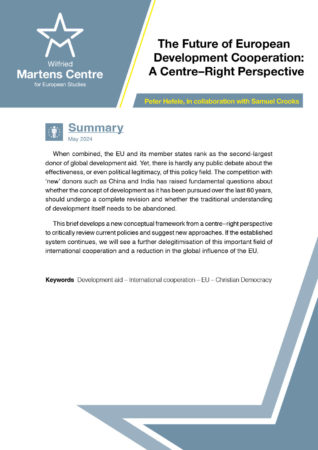
Policy Briefs
The Future of European Development Cooperation: A Centre–Right Perspective
-
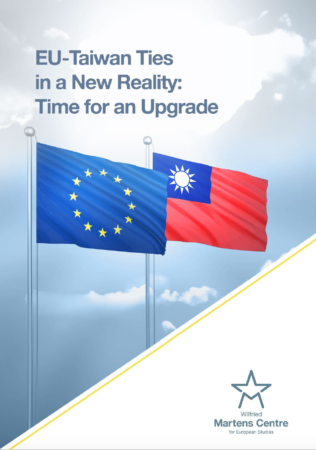
Other
EU-Taiwan Ties in a New Reality: Time for an Upgrade
-
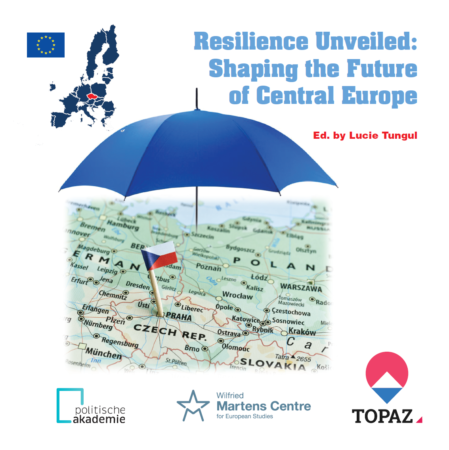
Collaborative
Resilience Unveiled: Shaping the Future of Central Europe
-
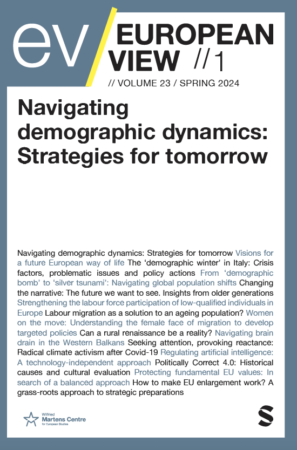
European View
Navigating demographic dynamics: Strategies for tomorrow
-
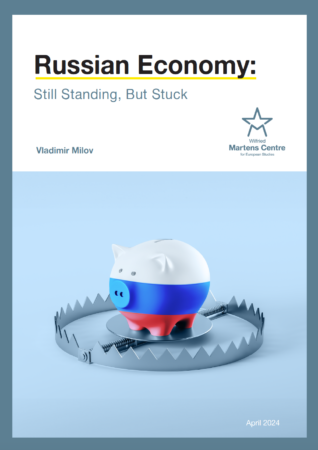
Ukraine
Russian Economy: Still Standing, But Stuck
-
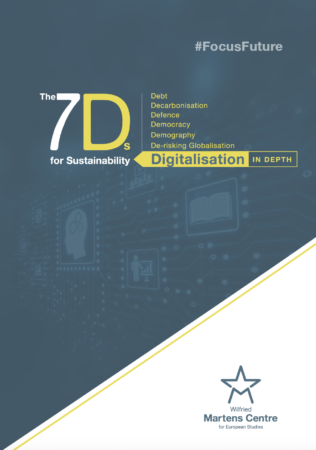
The 7Ds
The 7Ds – Digitalisation in Depth
-
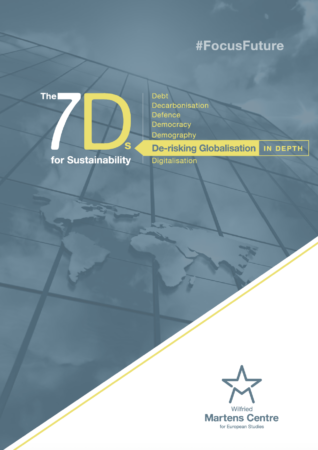
The 7Ds
The 7Ds – De-risking Globalisation in Depth
-
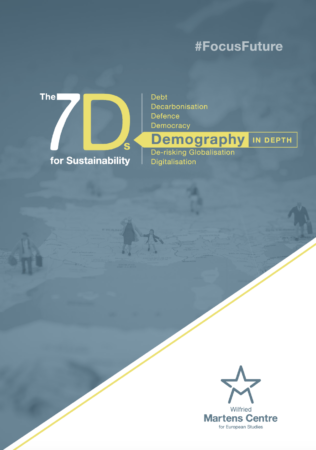
The 7Ds
The 7Ds – Demography in Depth
-
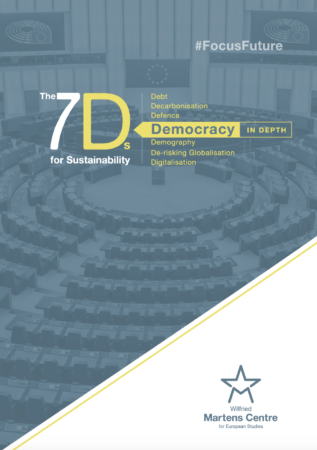
The 7Ds
The 7Ds – Democracy in Depth
-
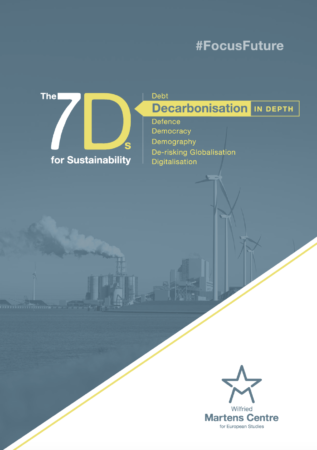
The 7Ds
The 7Ds – Decarbonisation in Depth
-
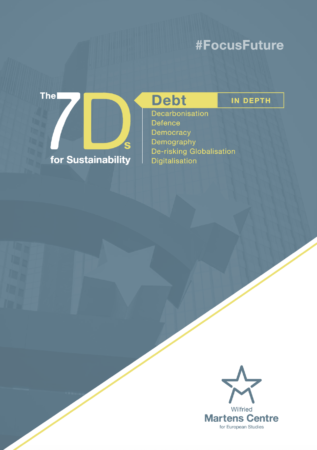
The 7Ds
The 7Ds – Debt in Depth
-
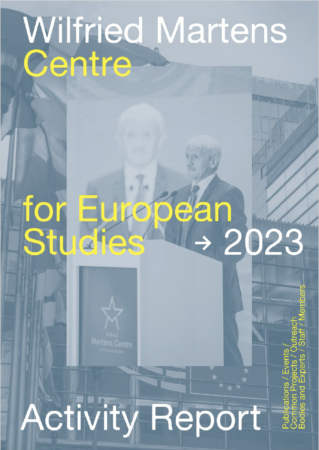
Activity Report
Activity Report 2023
-
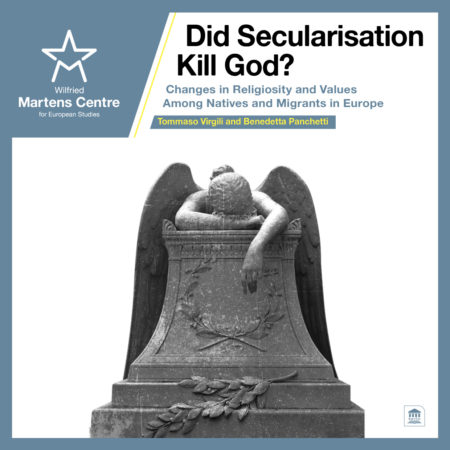
Research Papers
Did Secularisation Kill God? Changes in Religiosity and Values Among Natives and Migrants in Europe
-

The 7Ds
The 7Ds – Defence in Depth
-
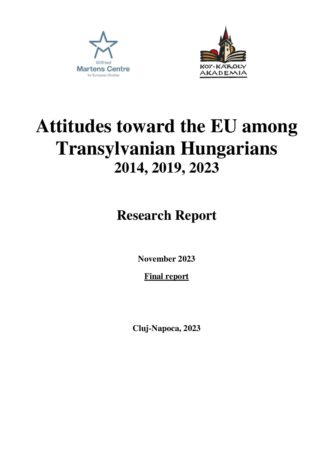
Collaborative
Attitudes towards the EU among the Transylvanian Hungarians
-

Collaborative
Transatlantic Trade and Technology: Partners or Rivals?
-
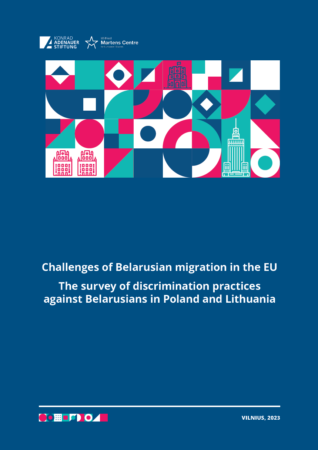
Collaborative
Challenges of Belarusian Migration in the EU
-

Ukraine
Ukraine as a Locus of Identity: Why History and Culture Matter
-
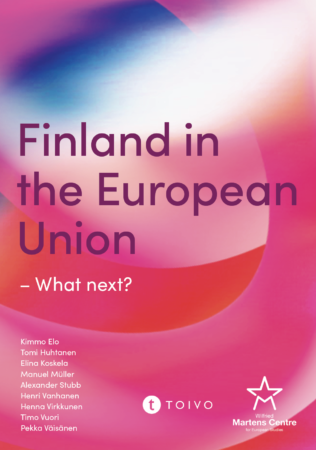
Collaborative
Finland in the European Union– What next?
-
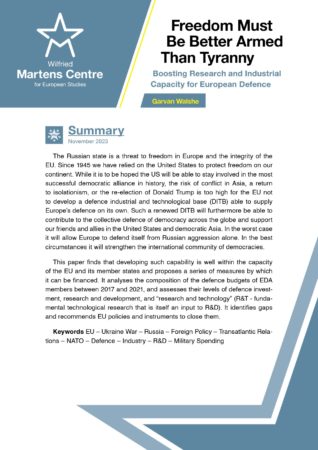
Policy Briefs
Freedom Must Be Better Armed Than Tyranny: Boosting Research and Industrial Capacity for European Defence
-
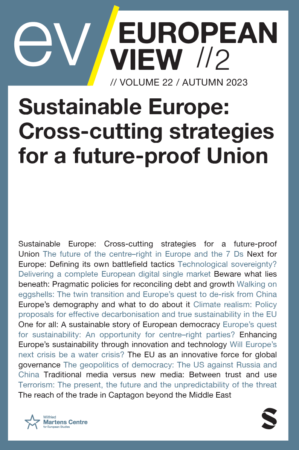
European View
Sustainable Europe: Cross-cutting strategies for a future-proof Union
-
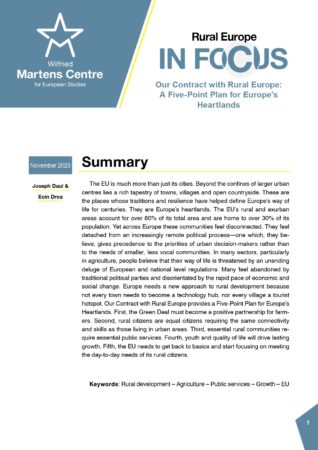
IN FOCUS
Rural Europe: Our Contract with Rural Europe – A Five-Point Plan for Europe’s Heartlands
-
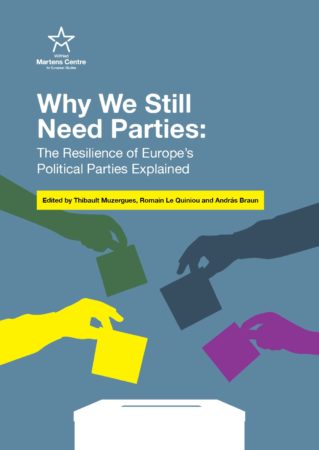
Collaborative
Why We Still Need Parties: The Resilience of Europe’s Political Parties Explained
-
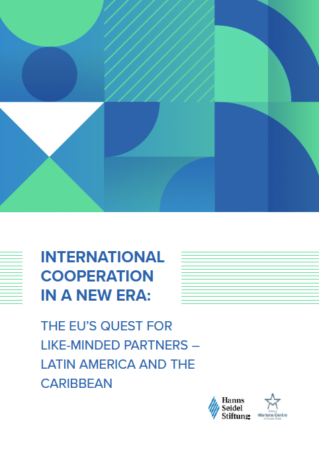
Collaborative
International Cooperation in a New Era: the EU’s Quest for Like-Minded Partners – Latin American and Caribbean
-
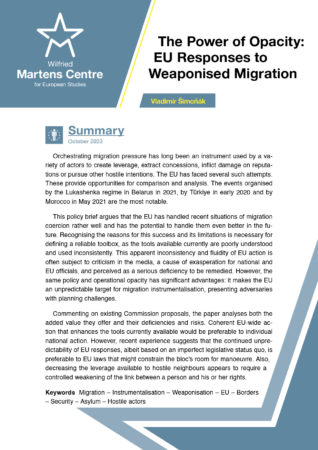
Policy Briefs
The Power of Opacity: EU Responses to Weaponised Migration
-
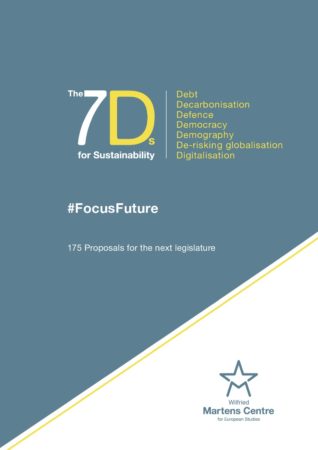
The 7Ds
The 7Ds for Sustainability: 175 Proposals for the Next Legislature
-
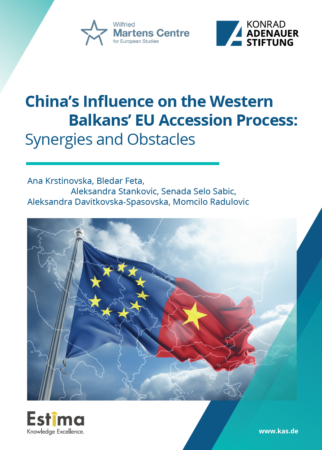
Collaborative
China’s Influence on the Western Balkans’ EU Accession Process: Synergies and Obstacles
-
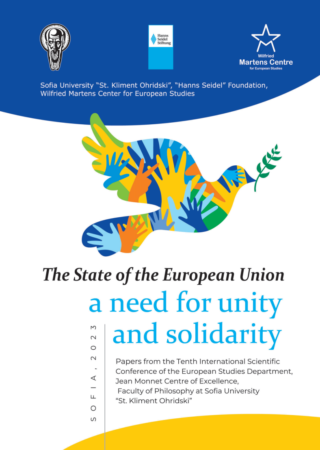
Collaborative
The State of the European Union – A Need for Unity and Solidarity
-
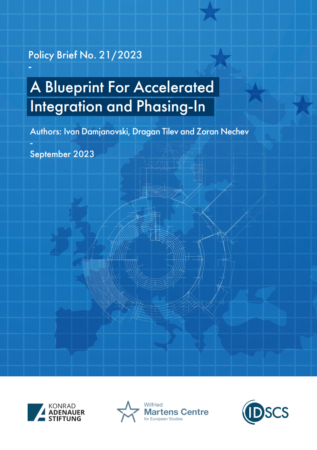
Collaborative
A Blueprint For Accelerated Integration and Phasing-In
-
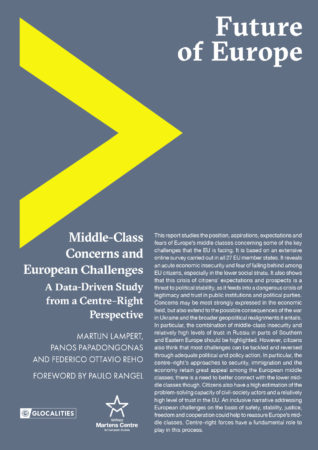
Future of Europe
Middle-Class Concerns and European Challenges: A Data-Driven Study from a Centre–Right Perspective
-

Collaborative
Security and Defence Days – Conference Proceedings
-
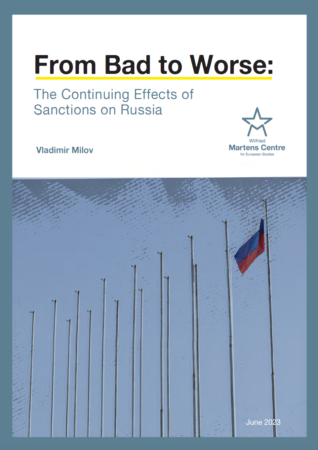
Ukraine
From Bad to Worse: The Continuing Effects of Sanctions on Russia
-
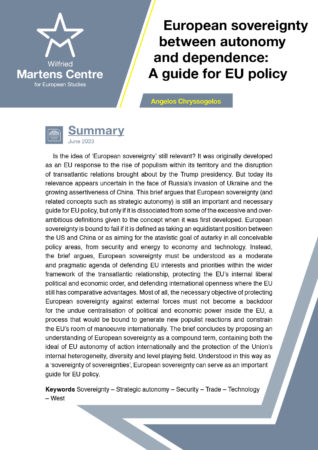
Policy Briefs
European sovereignty between autonomy and dependence: A guide for EU policy
-
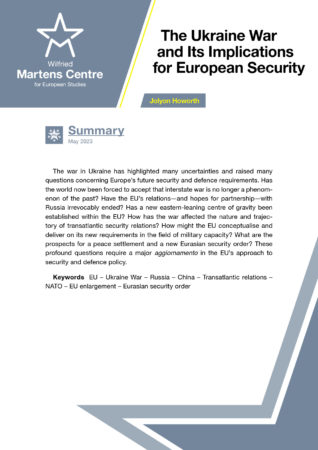
Ukraine
The Ukraine War and Its Implications for European Security
-
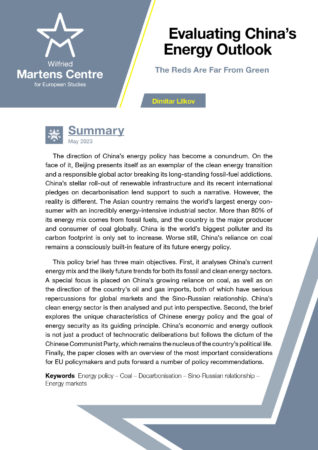
Policy Briefs
Evaluating China’s Energy Outlook: The Reds Are Far From Green
-
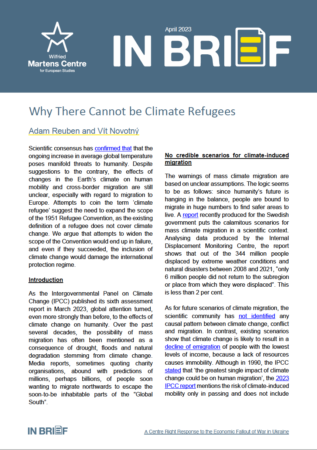
IN BRIEF
Why There Cannot be Climate Refugees
-

Other
Youth of the EPP: 25 Years on the Right Side of History
-
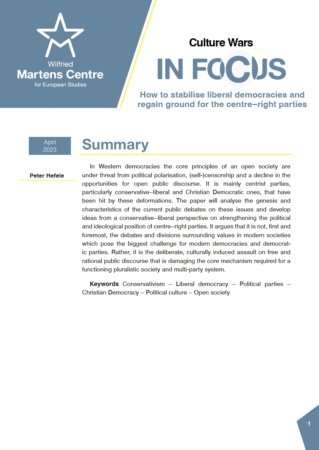
IN FOCUS
Culture Wars: How to stabilise liberal democracies and regain ground for the centre–right parties
-
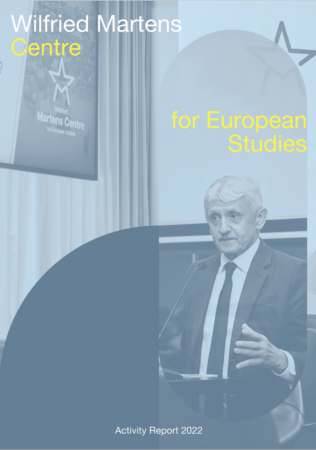
Activity Report
Activity Report 2022
-
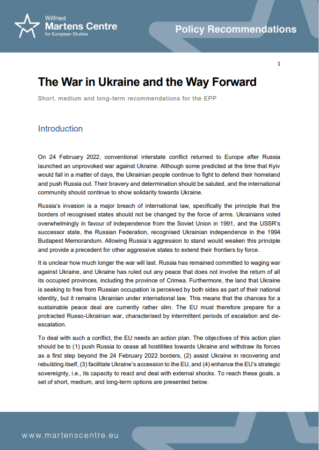
Ukraine
The War in Ukraine and the Way Forward
-
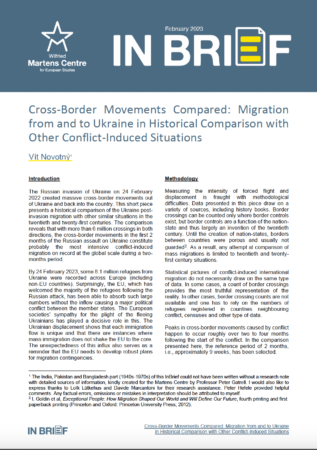
Ukraine
Cross-Border Movements Compared: Migration from and to Ukraine in Historical Comparison with Other Conflict-Induced Situations
-
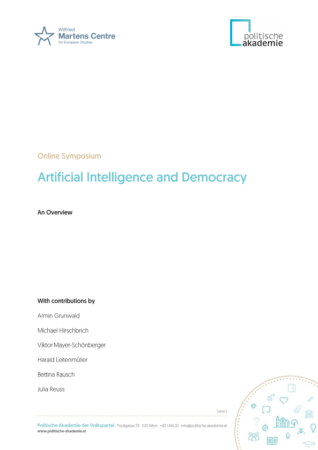
Collaborative
Artificial Intelligence and Democracy
-
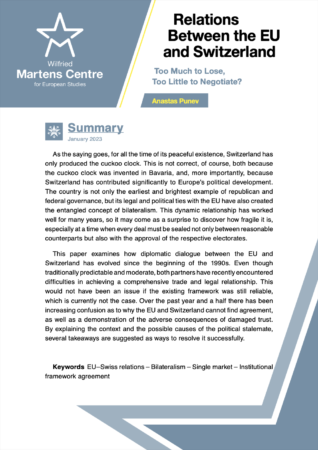
Policy Briefs
Relations Between the EU and Switzerland: Too Much to Lose, Too Little to Negotiate?
-
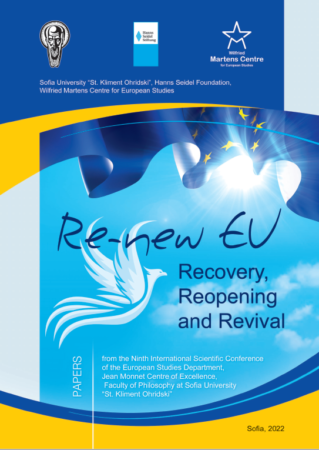
Collaborative
Re-new EU — Recovery, Reopening and Revival
-
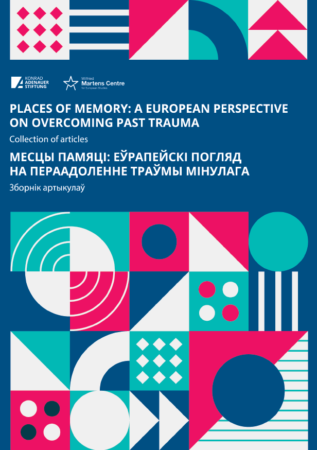
Collaborative
Places of Memory: a European Perspective on Overcoming Past Trauma
-
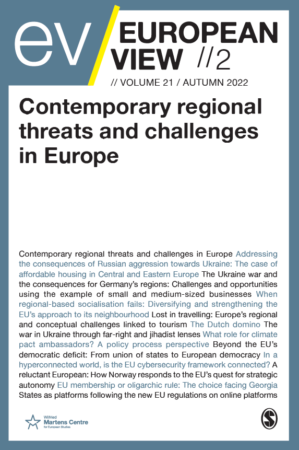
Ukraine
Contemporary regional threats and challenges in Europe
-
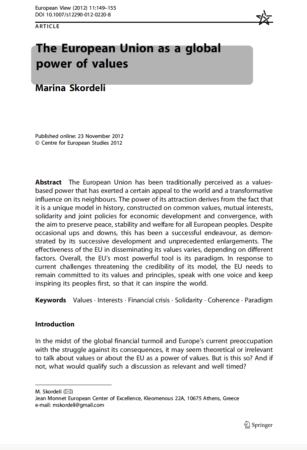
Other
The European Union as a Global Power of Values
-
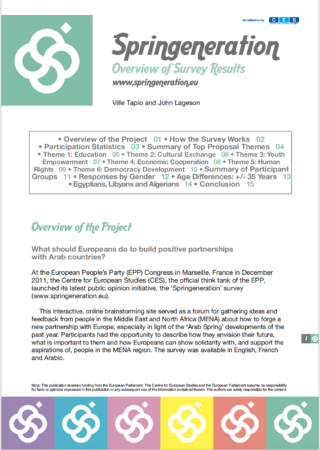
Other
Springeneration
-
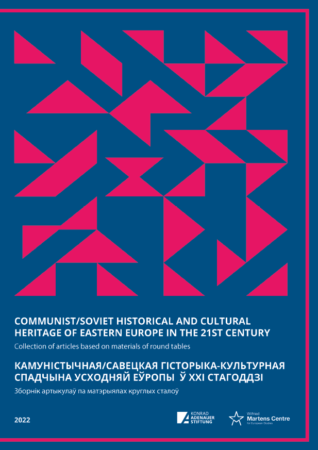
Collaborative
Communist/Soviet Historical and Cultural Heritage of Eastern Europe in the 21st Century
-
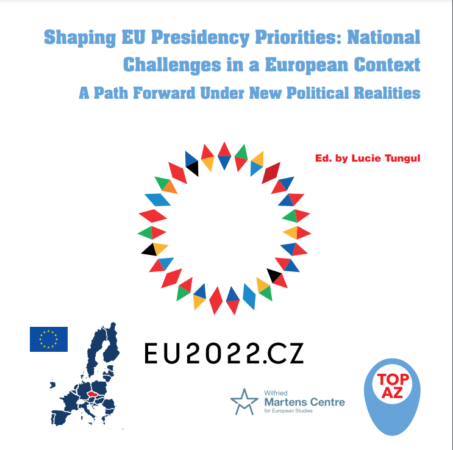
Collaborative
Shaping EU Presidency Priorities: National Challenges in a European Context. A Path Forward Under New Political Realities.
-
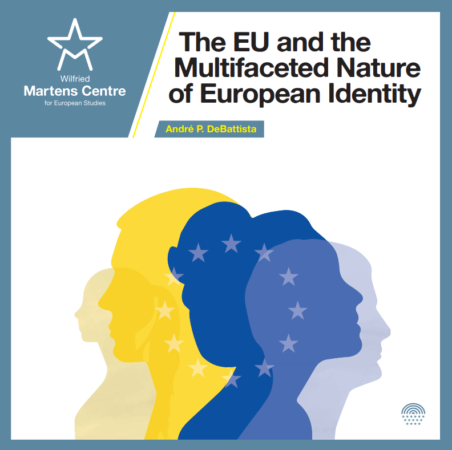
Research Papers
The EU and the Multifaceted Nature of European Identity
-

Collaborative
Artificial Intelligence: Threats and Opportunities for Europeans
-

IN FOCUS
‘Our European Way of Life’ as the Guiding Principle: Shifts in the Understanding of Immigrant Integration at the EU Level
-
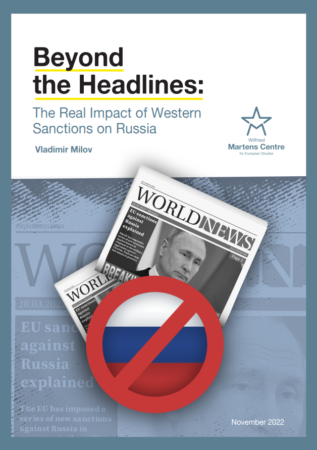
Ukraine
Beyond the Headlines: The Real Impact of Western Sanctions on Russia
-
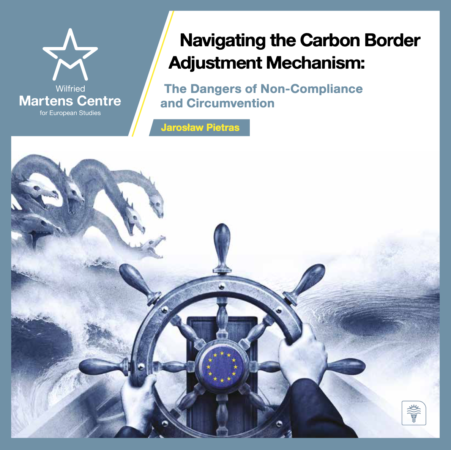
Research Papers
Navigating the Carbon Border Adjustment Mechanism: The Dangers of Non-Compliance and Circumvention
-
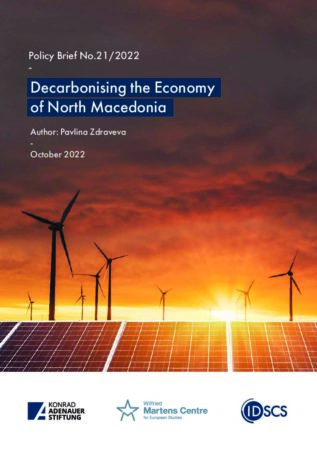
Collaborative
Decarbonising the Economy of North Macedonia
-
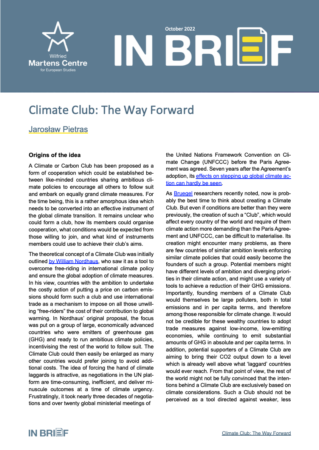
IN BRIEF
Climate Club: The Way Forward
-
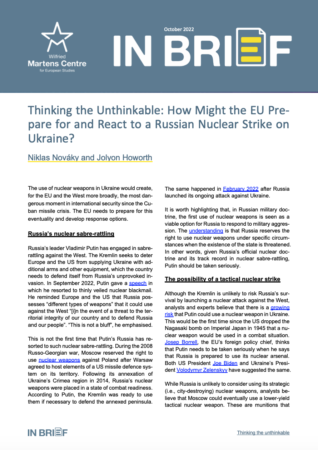
Ukraine
Thinking the Unthinkable: How Might the EU Prepare for and React to a Russian Nuclear Strike on Ukraine?
-

Future of Europe
EU Subsidiarity as an Antidote to Centralisation and Inefficiency
-
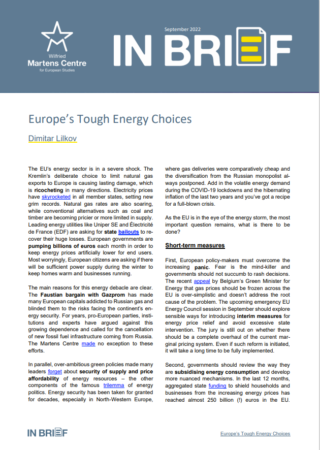
IN BRIEF
Europe’s Tough Energy Choices
-
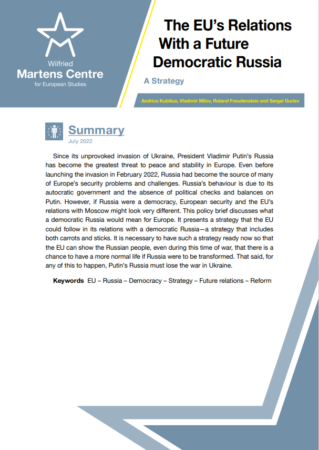
Policy Briefs
The EU’s Relations With a Future Democratic Russia: A Strategy
-
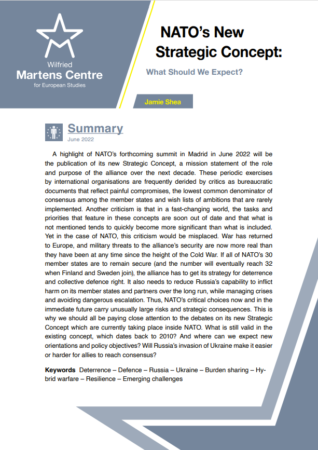
Policy Briefs
NATO’s New Strategic Concept: What Should We Expect?
-
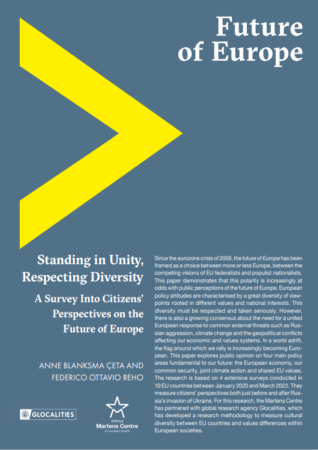
Future of Europe
Standing in Unity, Respecting Diversity: A Survey Into Citizens’ Perspectives on the Future of Europe
-
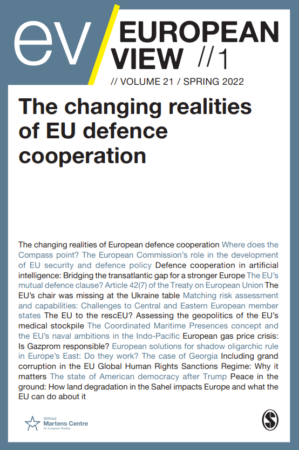
Ukraine
The changing realities of EU defence cooperation
-
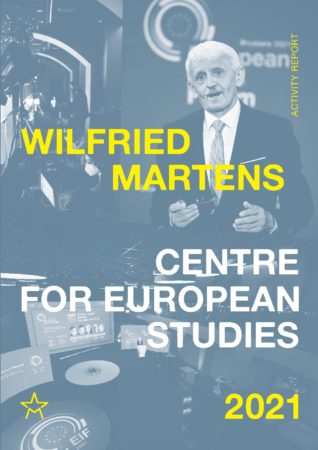
Activity Report
Activity Report 2021
-

Ukraine
Russia’s War Against Ukraine is Changing Europe’s Strategic Culture
-
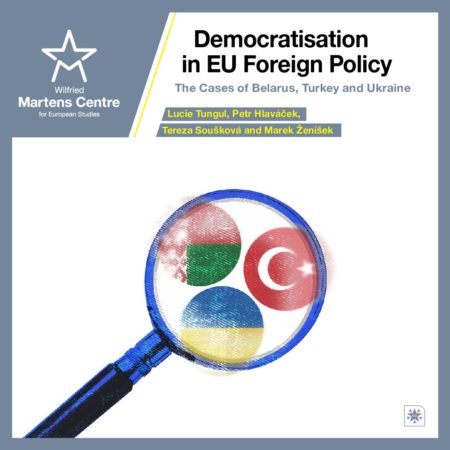
Ukraine
Democratisation in EU Foreign Policy: The Cases of Belarus, Turkey and Ukraine
-
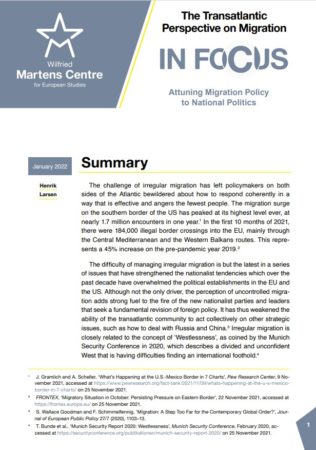
IN FOCUS
The Transatlantic Perspective on Migration: Attuning Migration Policy to National Politics
-

IN BRIEF
Why Brexit Britain is a Threat to the EU From the Left, not the Right
-

Collaborative
Building a Civil Society in Belarus
-
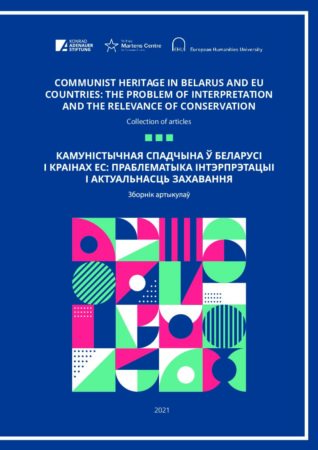
Collaborative
Communist Heritage in Belarus and EU Countries: The Problem of Interpretation and the Relevance of Conservation
-
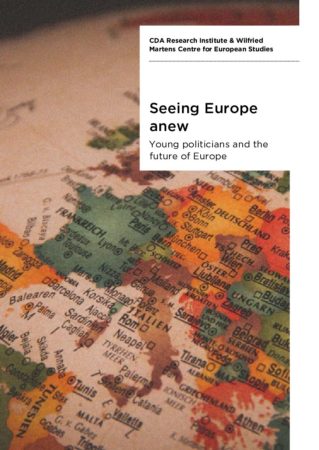
Collaborative
Seeing Europe anew: Young politicians and the future of Europe
-

Collaborative
Beyond resentment: A Journey through the Italian Middle Class from Postwar to Pandemics
-

Collaborative
The Call for More Europe: Ambitions and Realities
-
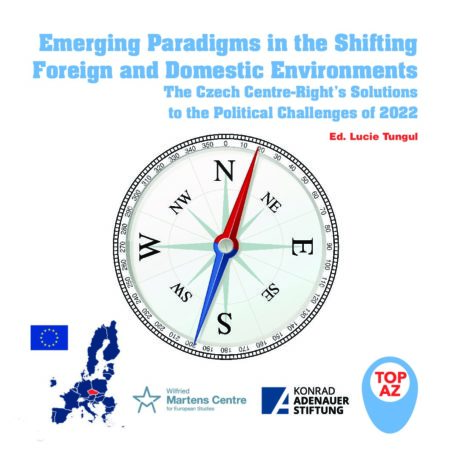
Collaborative
Emerging Paradigms in the Shifting Foreign and Domestic Environments: The Czech Centre-Right’s Solutions to the Political Challenges of 2022
-
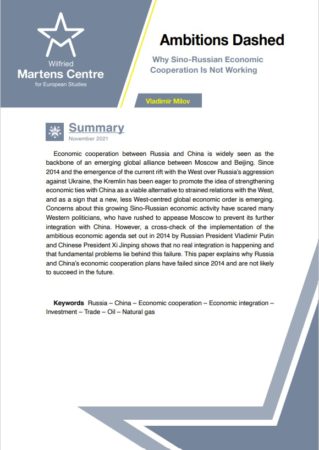
Policy Briefs
Ambitions Dashed: Why Sino-Russian Economic Cooperation Is Not Working
-
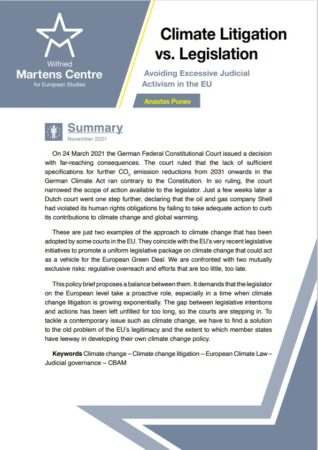
Policy Briefs
Climate Litigation vs. Legislation: Avoiding Excessive Judicial Activism in the EU
-

Collaborative
Civil Society Today: Principles and Political Potential
-

European View
Europe’s digital future: Navigating opportunities and challenges
-

Collaborative
Finland, Europe and the Western Security Community: What next?
-
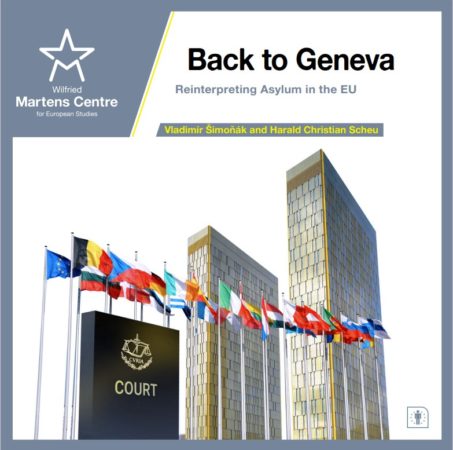
Research Papers
Back to Geneva: Reinterpreting Asylum in the EU
-
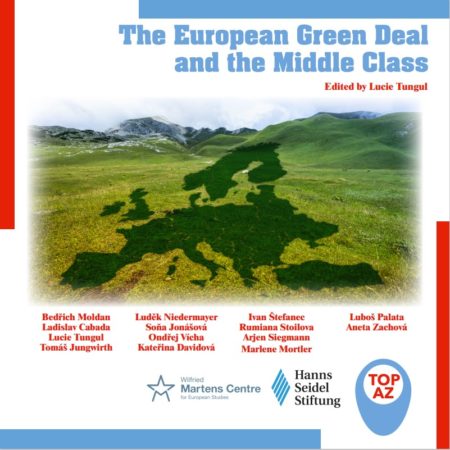
Collaborative
The European Green Deal and the Middle Class
-

Policy Briefs
Qualified Majority Voting in EU Foreign Policy: Make It So
-
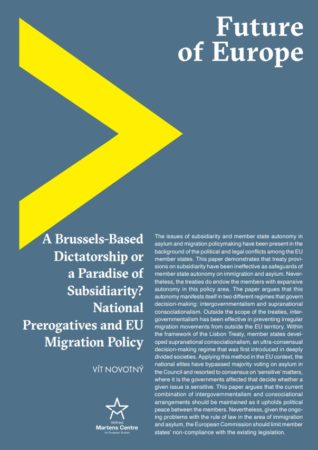
Future of Europe
A Brussels-Based Dictatorship or a Paradise of Subsidiarity? National Prerogatives and EU Migration Policy
-
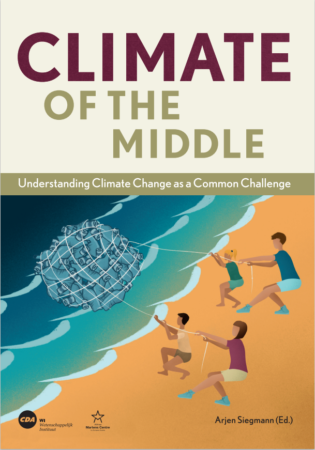
Collaborative
Climate of the Middle: Understanding Climate Change as a Common Challenge
-

IN BRIEF
Researching the Dragon – The EU Needs to Build up its Independent China Expertise
-

IN BRIEF
The 17+1 Mechanism: Something Doesn’t Add Up
-
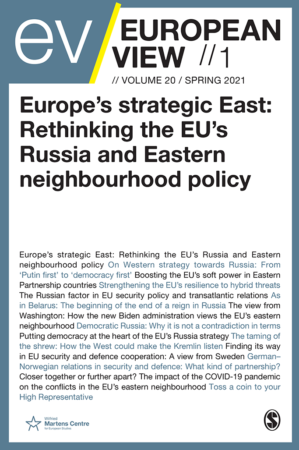
European View
Europe’s strategic East: Rethinking the EU’s Russia and Eastern neighbourhood policy
-
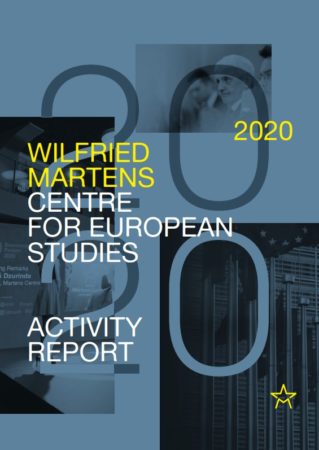
Activity Report
Activity Report 2020
-
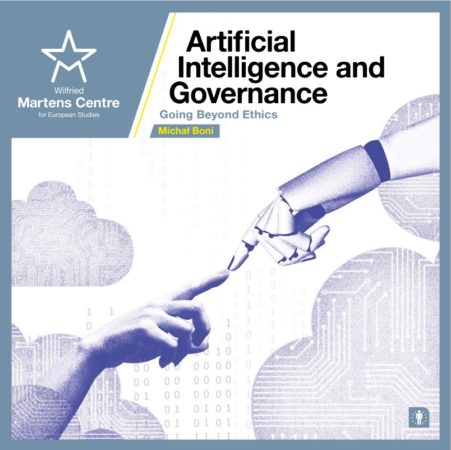
Research Papers
Artificial Intelligence and Governance: Going Beyond Ethics
-
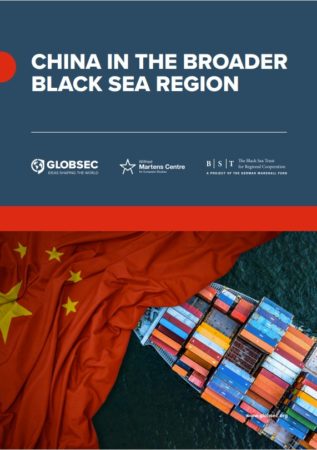
Collaborative
China in the Broader Black Sea Region
-
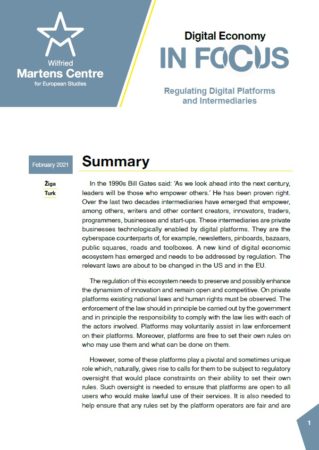
IN FOCUS
Digital Economy: Regulating Digital Platforms and Intermediaries
-
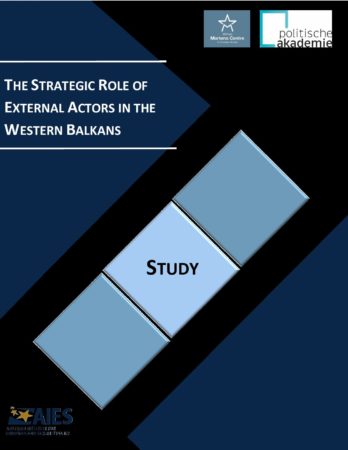
Collaborative
The Strategic Role of External Actors in the Western Balkans
-
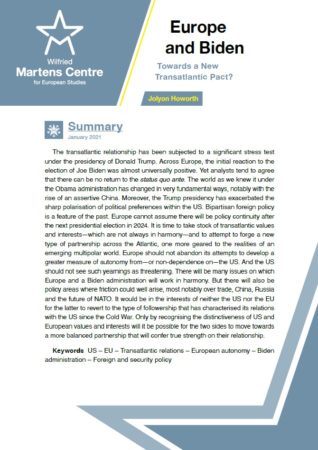
Policy Briefs
Europe and Biden: Towards a New Transatlantic Pact?
-
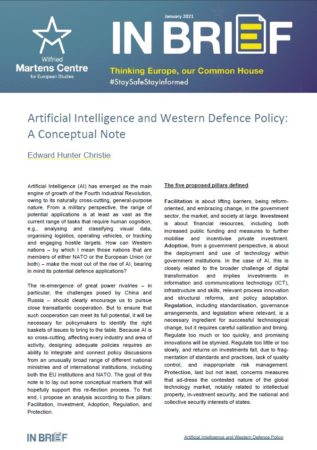
IN BRIEF
Artificial Intelligence and Western Defence Policy: A Conceptual Note
-
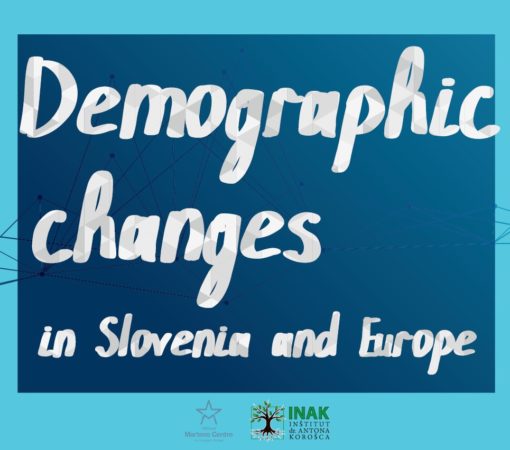
Collaborative
Demographic Changes in Slovenia and Europe
-
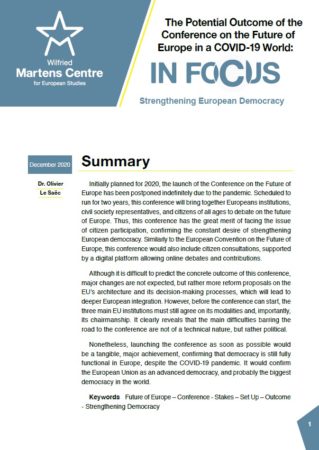
IN FOCUS
The Potential Outcome of the Conference on the Future of Europe in a COVID-19 World: Strengthening European Democracy
-
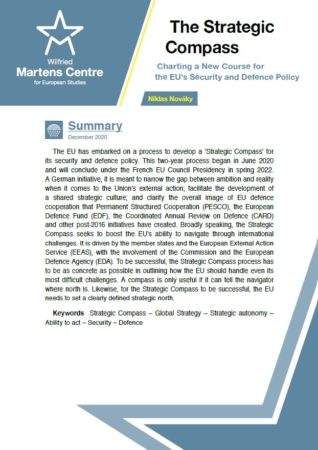
Policy Briefs
The Strategic Compass: Charting a New Course for the EU’s Security and Defence Policy
-
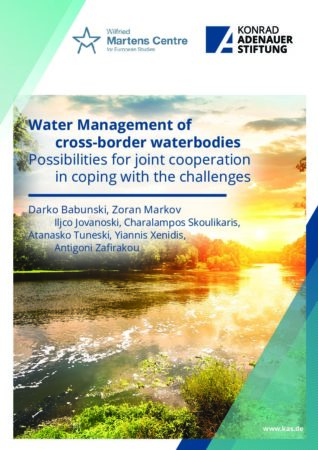
Collaborative
Water Management of cross-border waterbodies
-
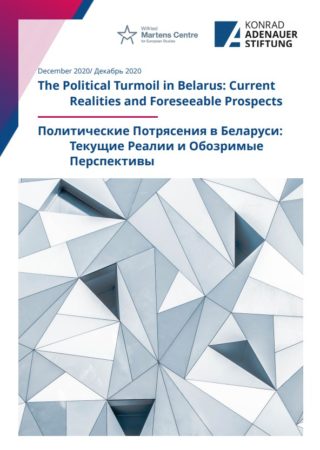
Collaborative
The Political Turmoil in Belarus: Current Realities and Foreseeable Prospects
-
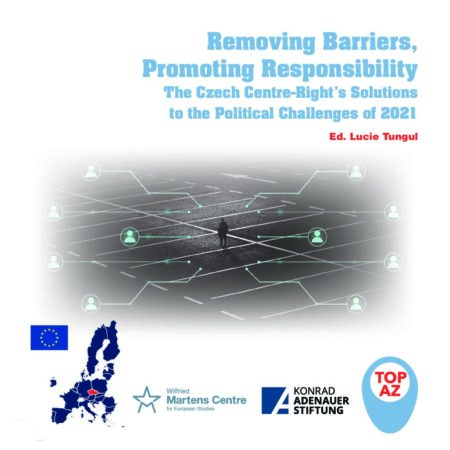
Collaborative
Removing Barriers, Promoting Responsibility: The Czech Centre-Right’s Solutions to the Political Challenges of 2021
-
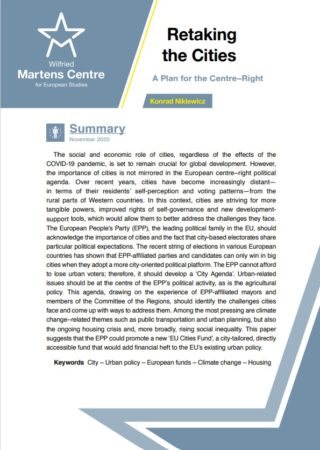
Policy Briefs
Retaking the Cities: A Plan for the Centre–Right
-
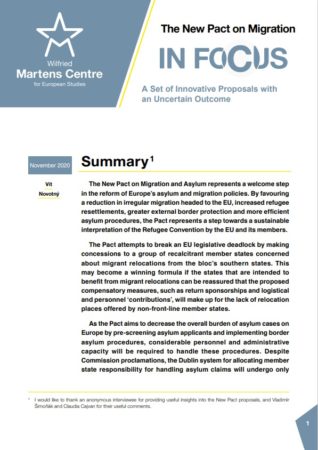
IN FOCUS
The New Pact on Migration: A Set of Innovative Proposals with an Uncertain Outcome
-
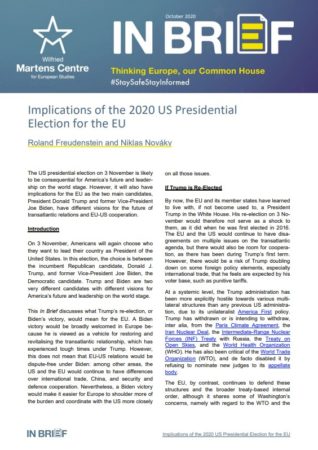
IN BRIEF
Implications of the 2020 US Presidential Election for the EU
-
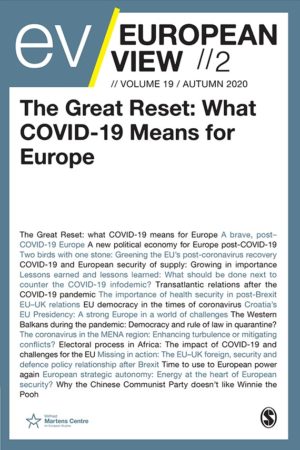
European View
The Great Reset: What COVID-19 Means for Europe
-
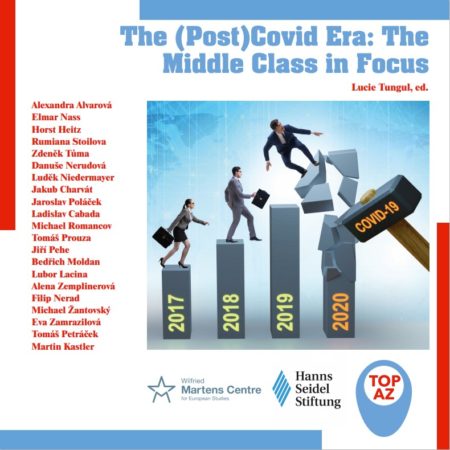
Collaborative
The (Post)Covid Era: The Middle Class in Focus
-
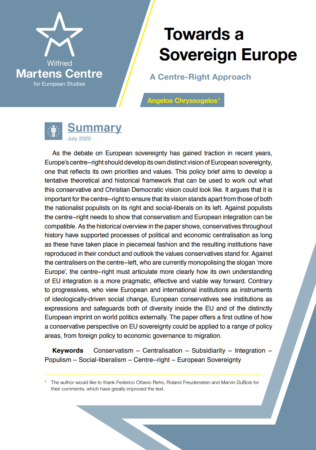
Policy Briefs
Towards a Sovereign Europe – A Centre-Right Approach
-
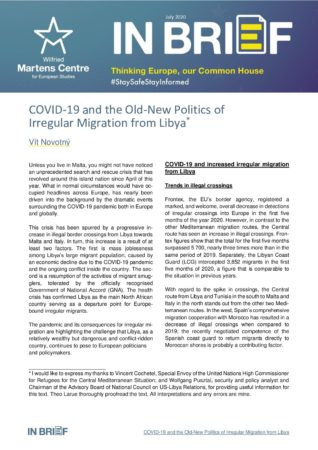
IN BRIEF
COVID-19 and the Old-New Politics of Irregular Migration from Libya
-
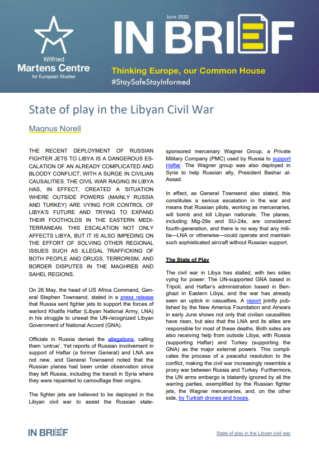
IN BRIEF
State of play in the Libyan Civil War
-
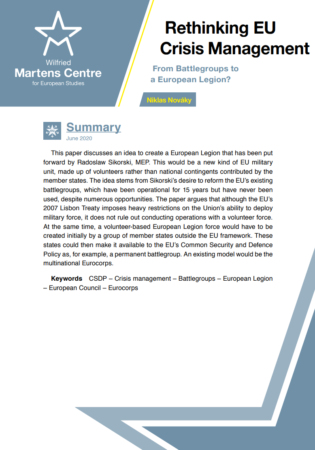
Policy Briefs
Rethinking EU Crisis Management – From Battlegroups to a European Legion?
-
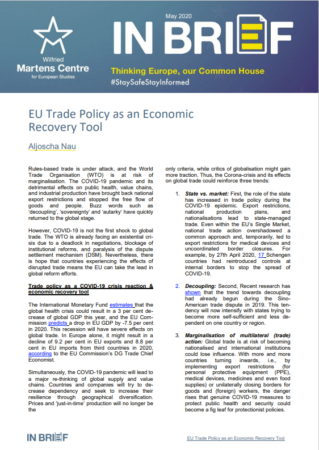
IN BRIEF
EU Trade Policy as an Economic Recovery Tool
-
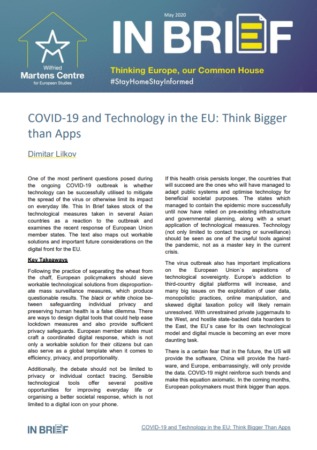
IN BRIEF
COVID-19 and Technology in the EU: Think Bigger than Apps
-
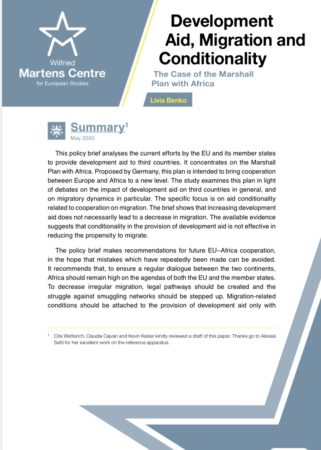
Policy Briefs
Development Aid, Migration and Conditionality – The Case of the Marshall Plan with Africa
-
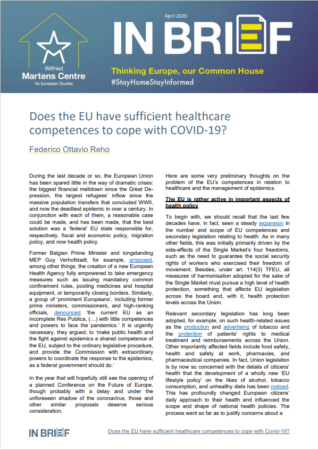
IN BRIEF
Does the EU have sufficient healthcare competences to cope with COVID-19?
-
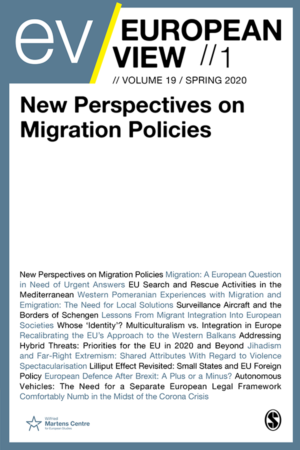
European View
New Perspectives on Migration Policies
-
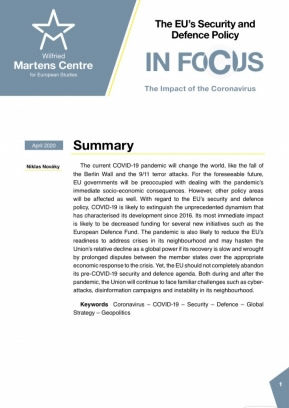
IN FOCUS
The EU’s Security and Defence Policy: The Impact of the Coronavirus
-
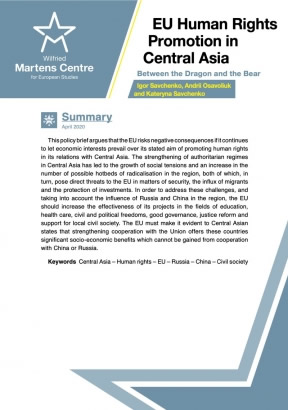
Policy Briefs
EU Human Rights Promotion in Central Asia – Between the Dragon and the Bear
-

Activity Report
Activity Report 2019
-
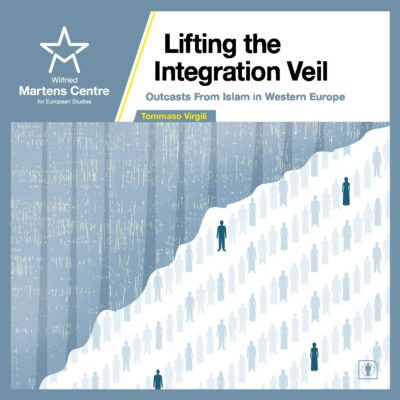
Research Papers
Lifting the Integration Veil: Outcasts from Islam in Western Europe
-
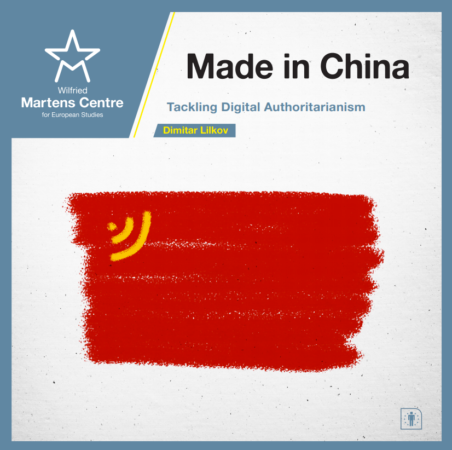
Research Papers
Made in China: Tackling Digital Authoritarianism
-
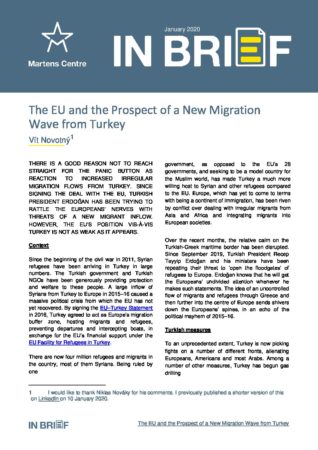
IN BRIEF
The EU and the Prospect of a New Migration Wave from Turkey
-
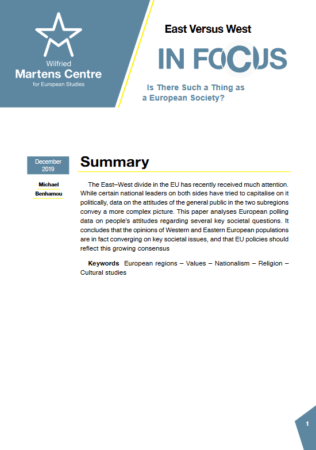
IN FOCUS
East Versus West: Is There Such a Thing as a European Society?
-
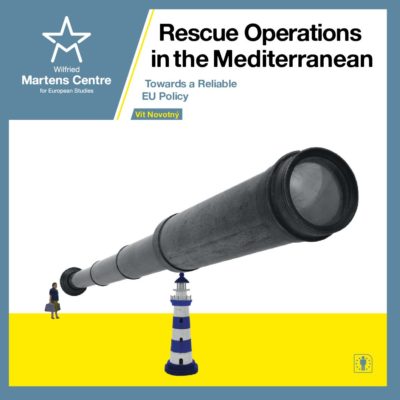
Research Papers
Rescue Operations in the Mediterranean: Towards a Reliable EU Policy
-
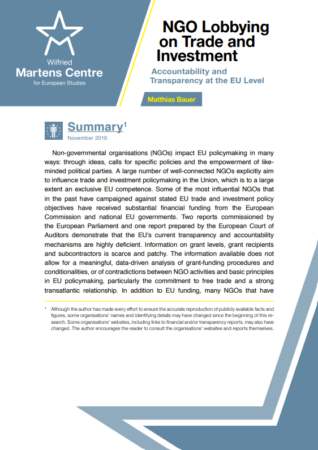
Policy Briefs
NGO Lobbying on Trade and Investment: Accountability and Transparency at the EU Level
-
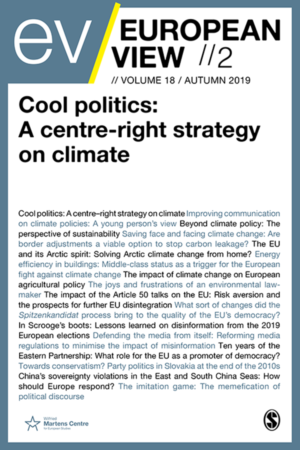
European View
Cool politics: A centre–right strategy on climate
-
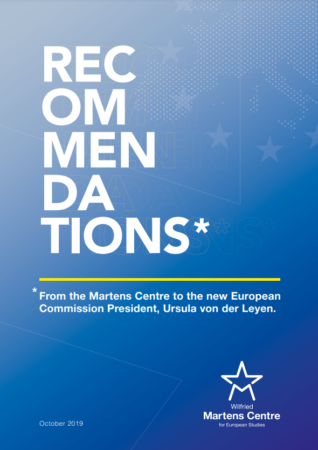
Other
Recommendations for the new European Commission President
-

Collaborative
Middle Class at a Crossroads
-

Research Papers
The Renewal of Vows: A New Transatlantic Chapter for Europe and America
-
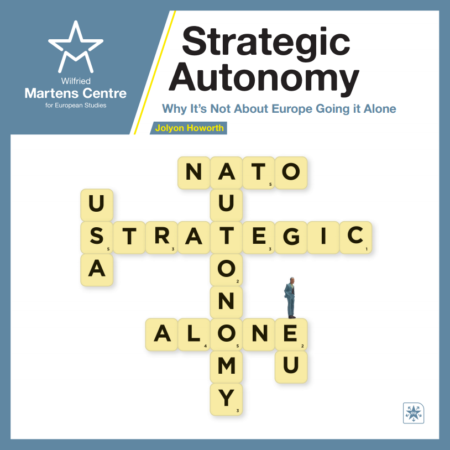
Research Papers
Strategic Autonomy: Why It’s Not About Europe Going it Alone
-
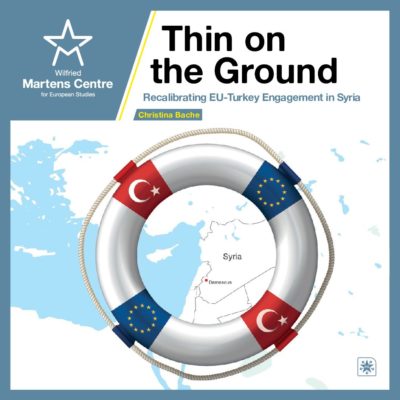
Research Papers
Thin on the Ground: Recalibrating EU-Turkey Engagement in Syria
-
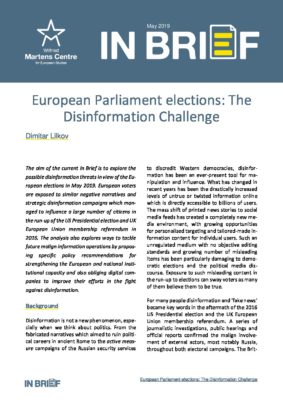
IN BRIEF
European Parliament Elections: the Disinformation Challenge
-
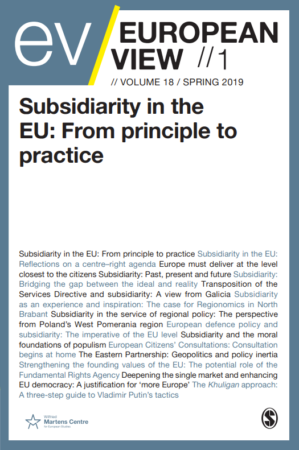
European View
Subsidiarity in the EU: From principle to practice
-
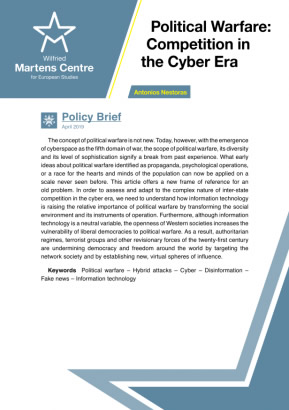
Policy Briefs
Political Warfare: Competition in the Cyber Era
-
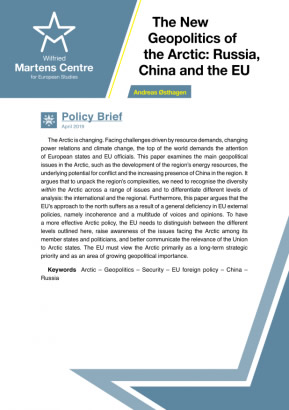
Policy Briefs
The New Geopolitics of the Arctic: Russia, China and the EU
-
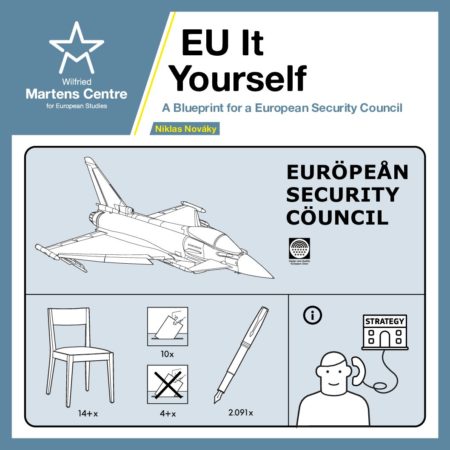
Research Papers
EU It Yourself: A Blueprint for a European Security Council
-
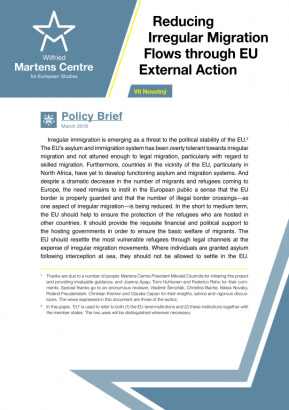
Policy Briefs
Reducing Irregular Migration Flows through EU External Action
-
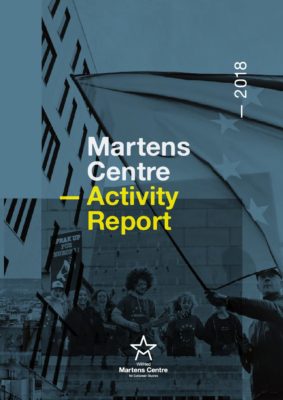
Activity Report
Activity Report 2018
-
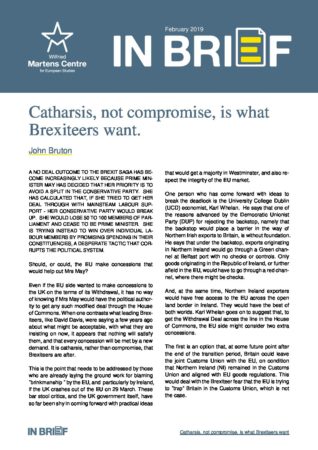
IN BRIEF
Catharsis, not compromise, is what Brexiteers want
-
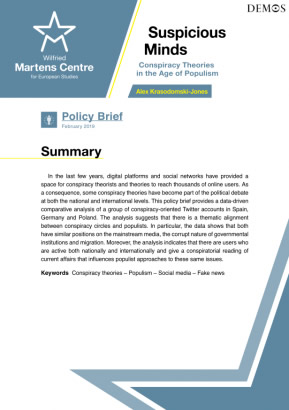
Policy Briefs
Suspicious minds: Conspiracy Theories in the Age of Populism
-
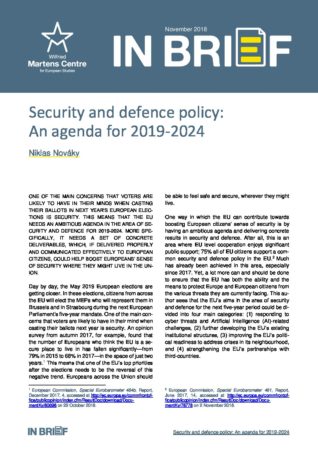
IN BRIEF
Security and Defence policy: An Agenda for 2019-2024
-

Policy Briefs
25 Years of Spitzenkandidaten: What Does the Future Hold?
-
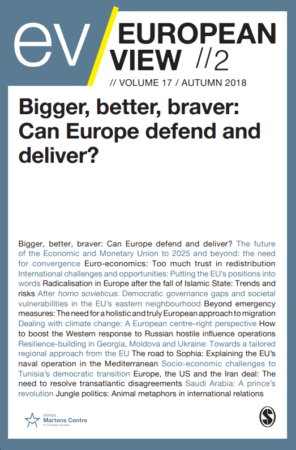
European View
Bigger, better, braver: Can Europe defend and deliver?
-
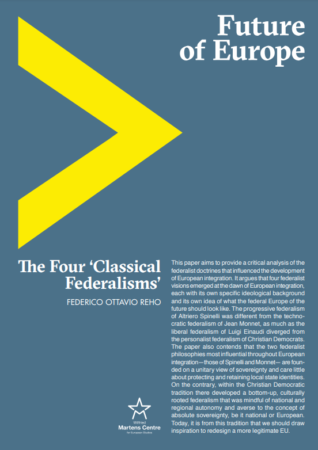
Future of Europe
The Four ‘Classical Federalisms’
-
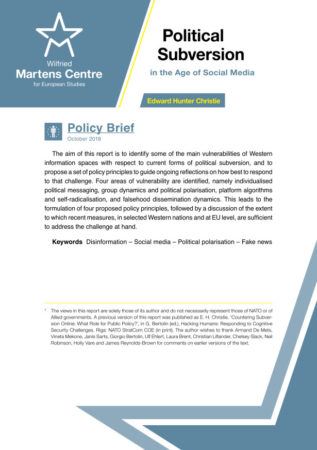
Policy Briefs
Political Subversion in the Age of Social Media
-
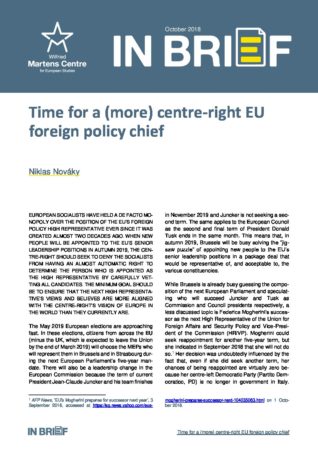
IN BRIEF
Time for a (more) centre-right EU foreign policy chief
-
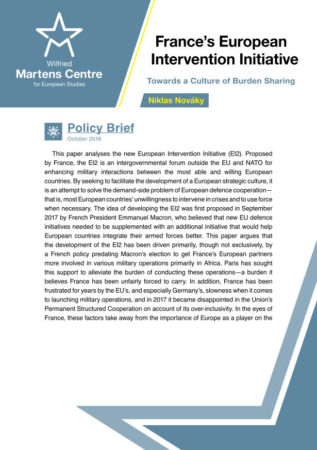
Policy Briefs
France’s European Intervention Initiative: Towards a Culture of Burden Sharing
-

IN FOCUS
North Korea: Towards a More Effective EU Policy
-

Research Papers
The Future of Work: Robots Cooking Free Lunches?
-
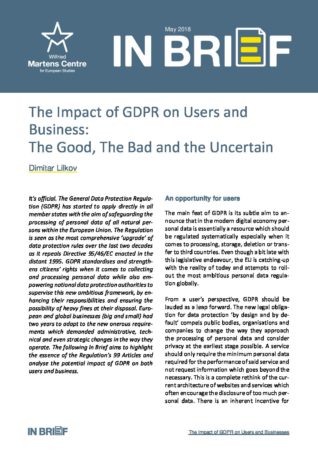
IN BRIEF
The Impact of GDPR on Users and Business: The Good, The Bad and the Uncertain
-
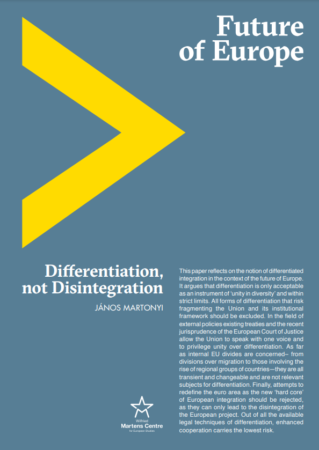
Future of Europe
Differentiation, not Disintegration
-
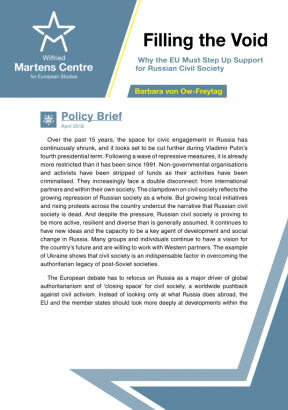
Policy Briefs
Filling the Void: Why the EU Must Step Up Support for Russian Civil Society
-
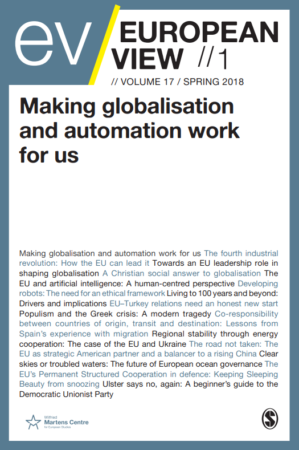
European View
Making globalisation and automation work for us
-
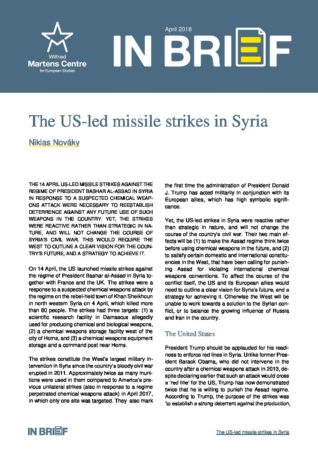
IN BRIEF
The US-led missile strikes in Syria
-

IN FOCUS
European Energy Security: The Case Against Nord Stream 2
-
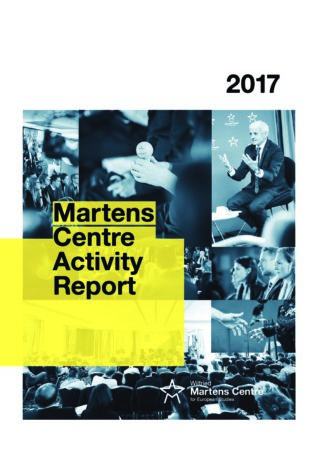
Activity Report
Activity Report 2017
-
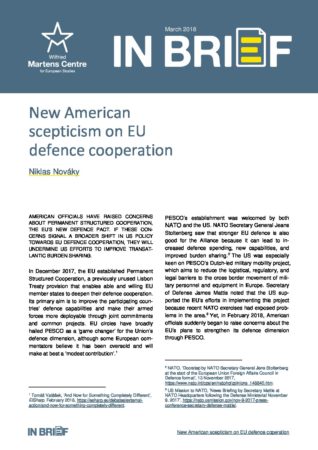
IN BRIEF
New American scepticism on EU defence cooperation
-
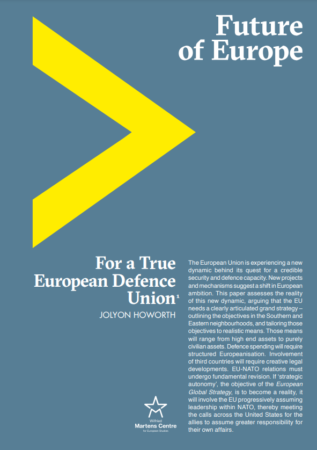
Future of Europe
For a True European Defence Union
-
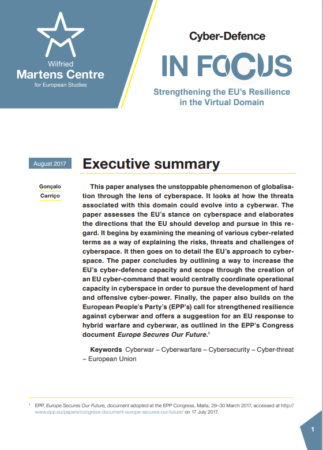
IN FOCUS
Cyber-Defence: Strengthening the EU’s Resilience in the Virtual Domain
-

Research Papers
Weeding out Fake News: An Approach to Social Media Regulation
-
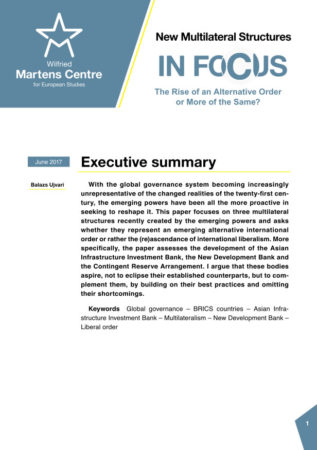
IN FOCUS
New Multilateral Structures: the Rise of an Alternative Order or More of the Same?
-
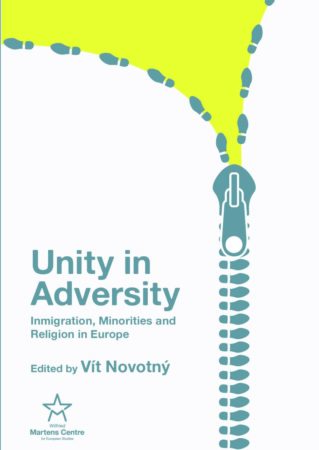
Collaborative
Unity in Adversity: Immigration, Minorities and Religion in Europe
-
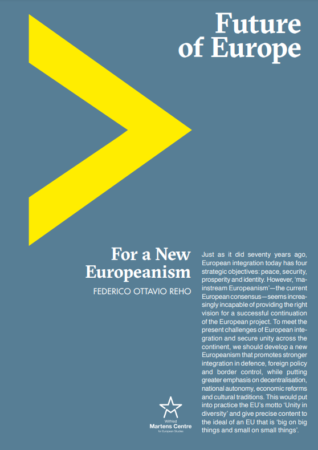
Future of Europe
For a New Europeanism
-
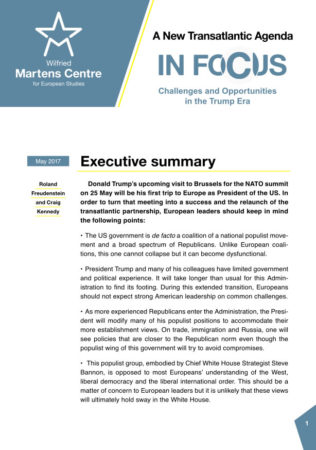
IN FOCUS
A New Transatlantic Agenda: Challenges and Opportunities in the Trump Era
-
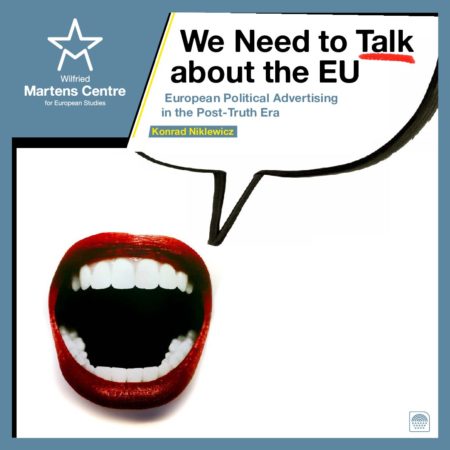
Research Papers
We Need to Talk about the EU: European Political Advertising in the Post-Truth Era
-
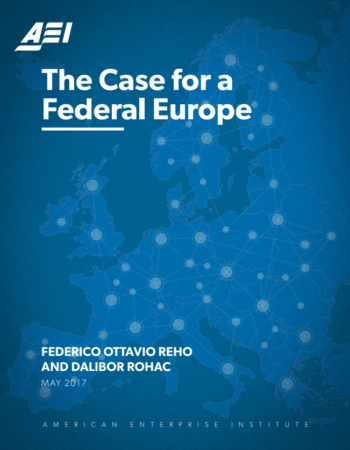
Other
The Case for a Federal Europe
-
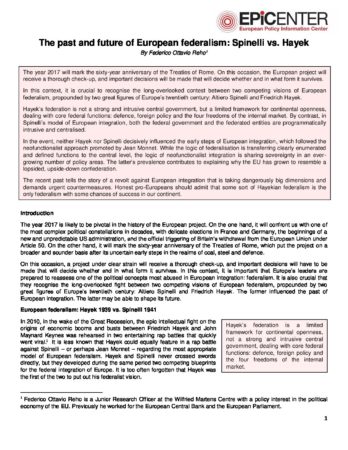
Other
The past and future of European federalism: Spinelli vs. Hayek
-
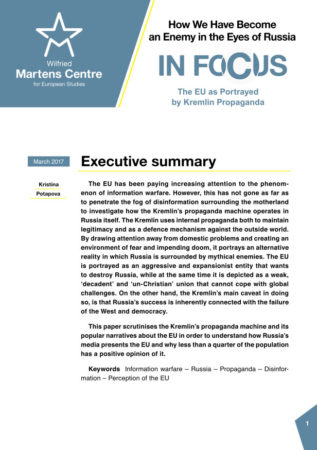
IN FOCUS
How We Have Become an Enemy in the Eyes of Russia: The EU as Portrayed by Kremlin Propaganda
-
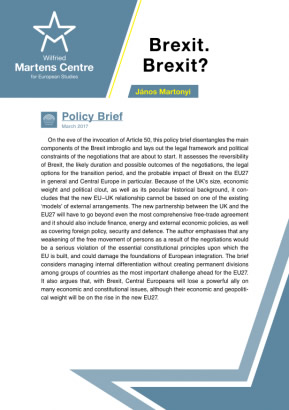
Policy Briefs
Brexit. Brexit?
-

IN FOCUS
Security Policy: The Case for a Postmodern EU Defence Architecture
-
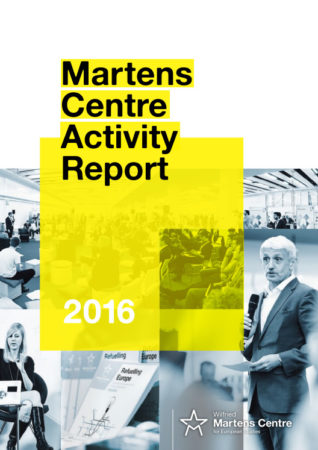
Activity Report
Activity Report 2016
-
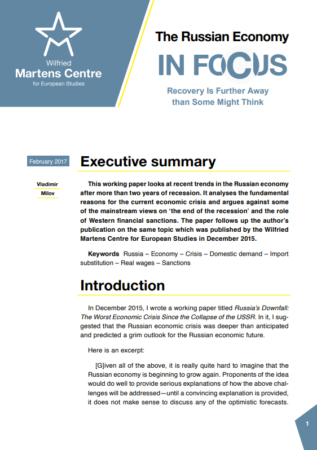
IN FOCUS
The Russian Economy: Recovery Is Further Away than Some Might Think
-
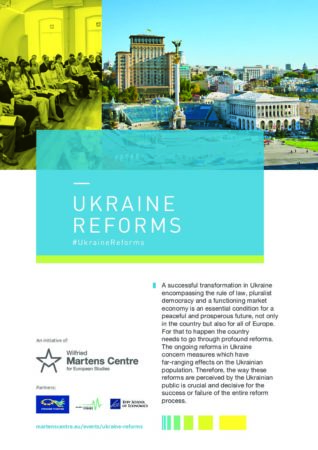
Ukraine
Ukraine Reforms: milestones and achievements
-
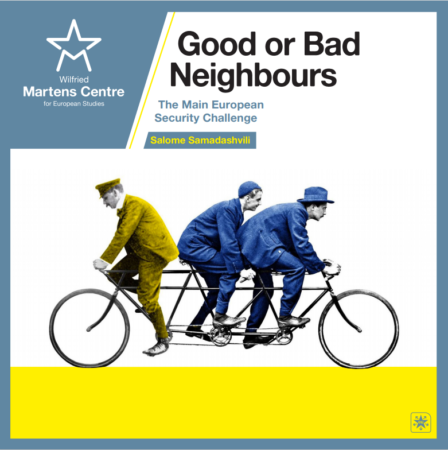
Research Papers
Good or Bad Neighbours: The Main European Security Challenge
-
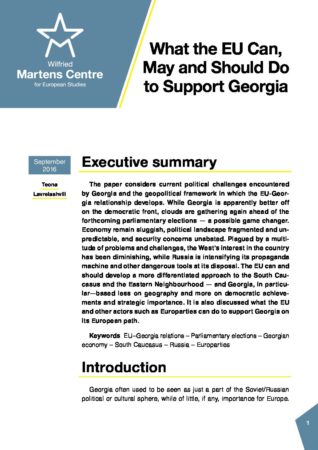
Policy Briefs
What the EU Can, May and Should Do to Support Georgia
-
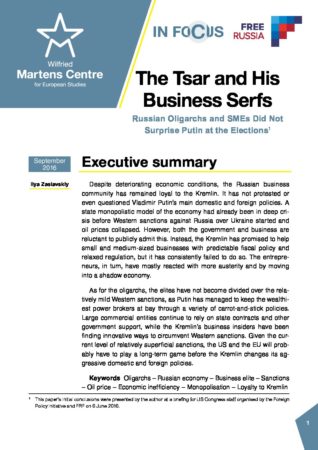
IN FOCUS
The Tsar and His Business Serfs: Russian Oligarchs and SMEs Did Not Surprise Putin at the Elections
-
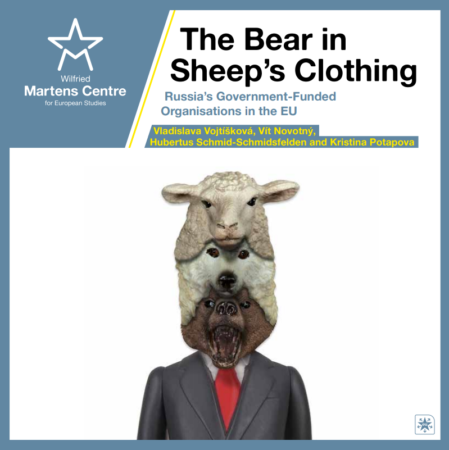
Research Papers
The Bear in Sheep’s Clothing: Russia’s Government-Funded Organisations in the EU
-

Policy Briefs
From Disapproval to Change? Russia’s Population May Surprise Putin at the Next Elections
-
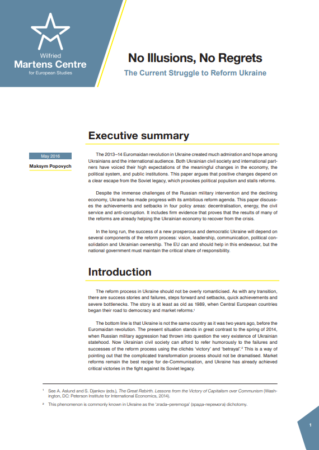
Ukraine
No Illusions, No Regrets: The Current Struggle to Reform Ukraine
-
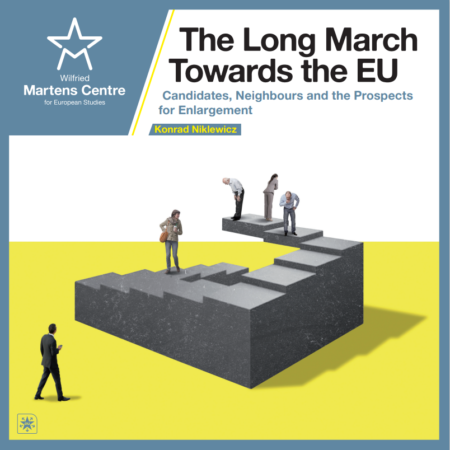
Research Papers
The Long March Towards the EU: Candidates, Neighbours and the Prospects for Enlargement
-
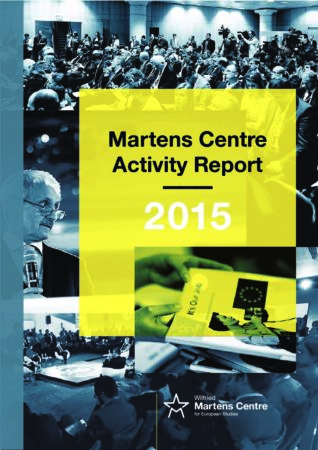
Activity Report
Activity Report 2015
-
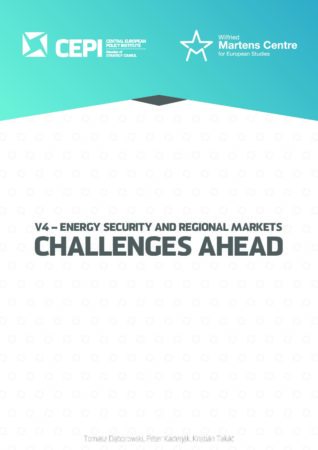
Other
V4 – Energy Security and Regional Markets: Challenges Ahead
-
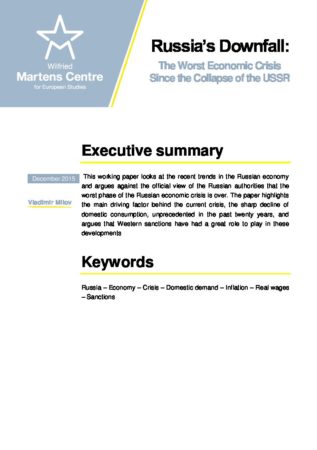
Policy Briefs
Russia’s Downfall: The Worst Economic Crisis Since the Collapse of the USSR
-

Research Papers
Innocence and War: Searching for Europe’s Strategy in Syria
-
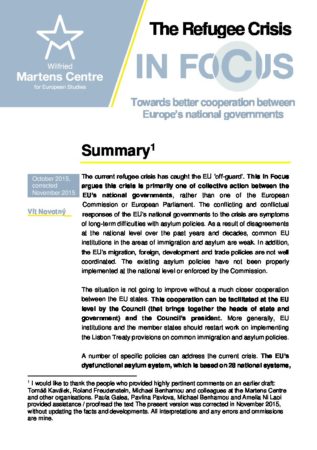
IN FOCUS
The Refugee Crisis: Towards better cooperation between Europe’s national governments
-
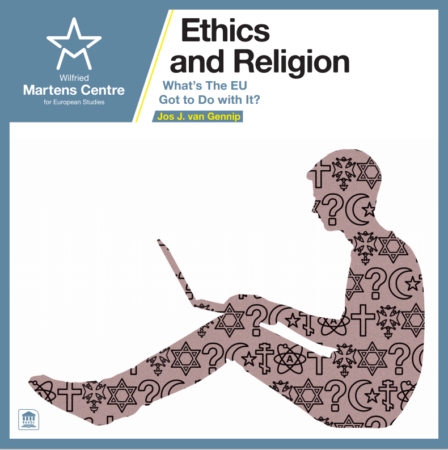
Research Papers
Ethics and Religion: What’s the EU Got to Do with It?
-
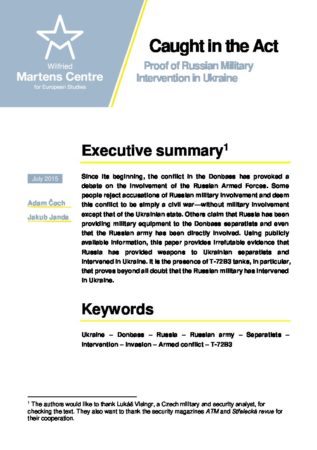
Ukraine
Caught in the Act: Proof of Russian Military Intervention in Ukraine
-
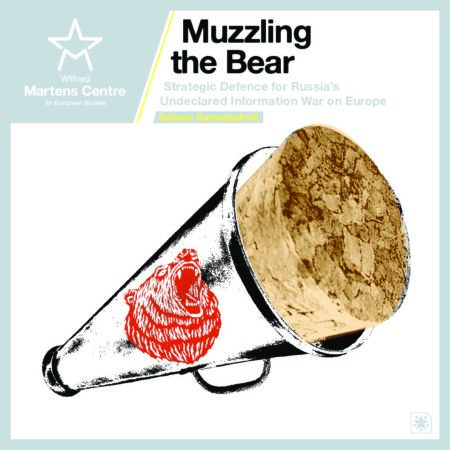
Research Papers
Muzzling the bear: Strategic Defence for Russia’s Undeclared Information War on Europe
-
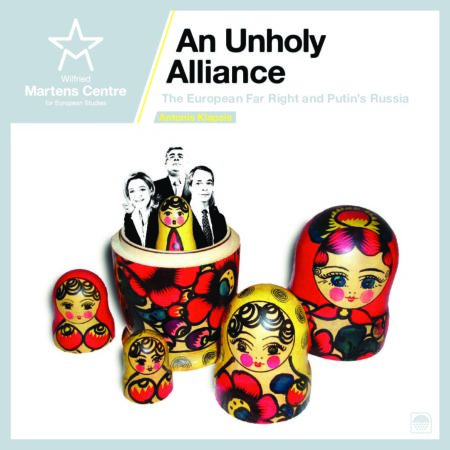
Research Papers
An Unholy Alliance: The European Far Right and Putin’s Russia
-
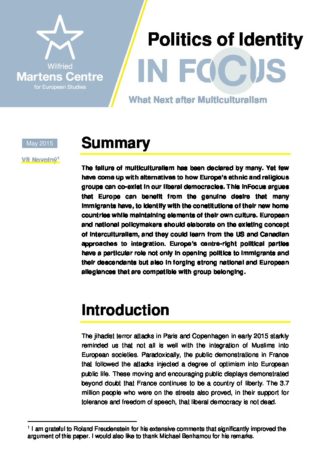
IN FOCUS
Politics of Identity: What Next after Multiculturalism
-
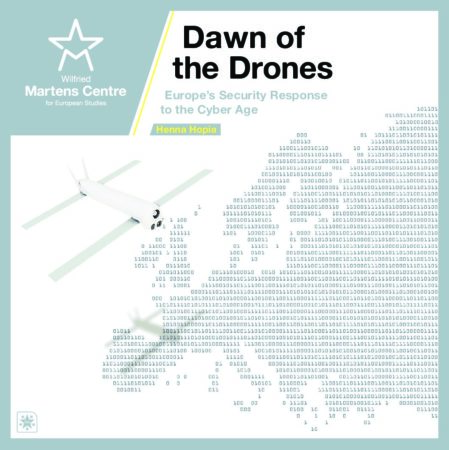
Research Papers
Dawn of the Drones: Europe’s Security Response to the Cyber Age
-
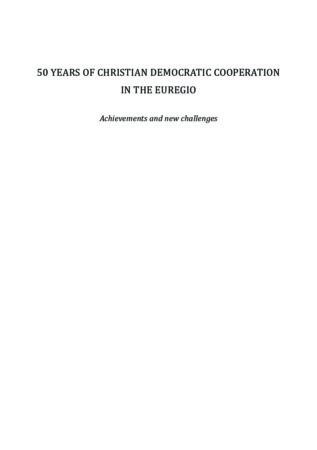
Collaborative
50 Years of Christian Democratic Cooperation in the EUREGIO
-

Activity Report
Activity Report 2014
-
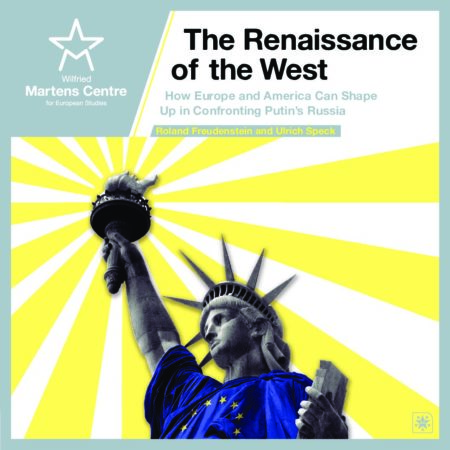
Research Papers
The Renaissance of the West: How Europe and America Can Shape Up in Confronting Putin’s Russia
-
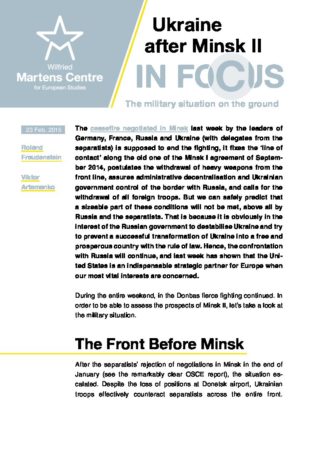
Ukraine
Ukraine after Minsk II: The military situation on the ground
-
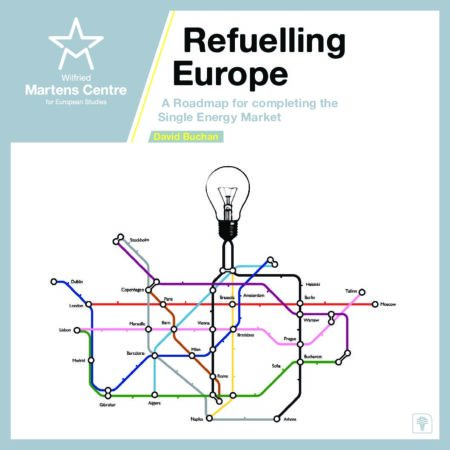
Research Papers
Refuelling Europe: A Roadmap for completing the Single Energy Market
-
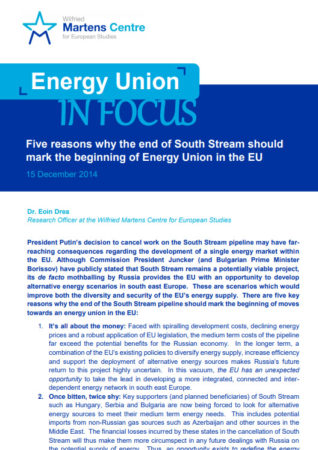
IN FOCUS
European Energy Union: Why the end of South Stream should mark its beginning
-
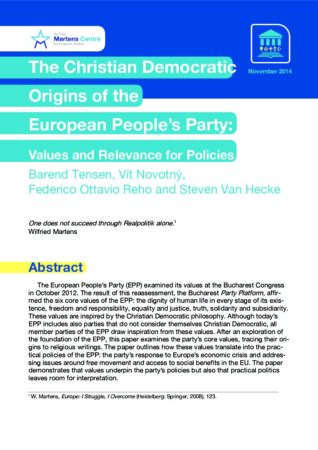
Policy Briefs
The Christian Democratic Origins of the European People’s Party
-

Research Papers
Building a Lifeline for Freedom: Eastern Partnership 2.0
-
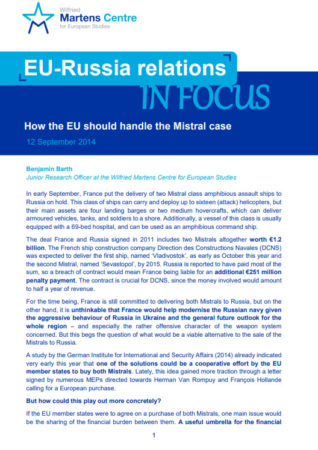
IN FOCUS
EU-Russia relations: How the EU should handle the Mistral case
-

Other
Post-electoral Analysis: EP Elections 2014
-
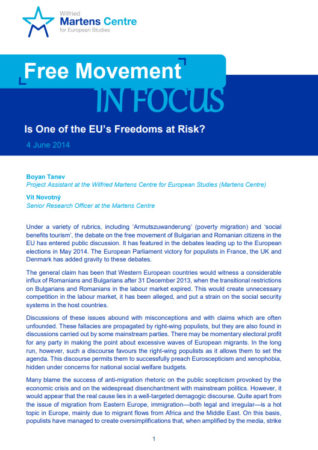
IN FOCUS
Free Movement: Is One of the EU’s Freedoms at Risk?
-
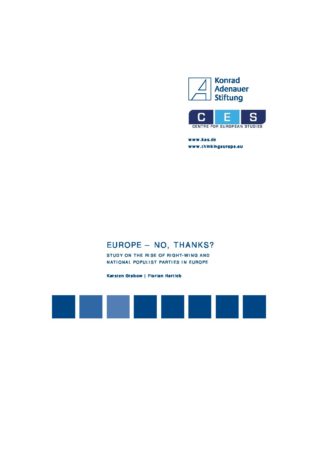
Collaborative
Europe – No, Thanks? Study on the rise of right-wing and national populist parties in Europe
-

Activity Report
Activity Report 2013
-
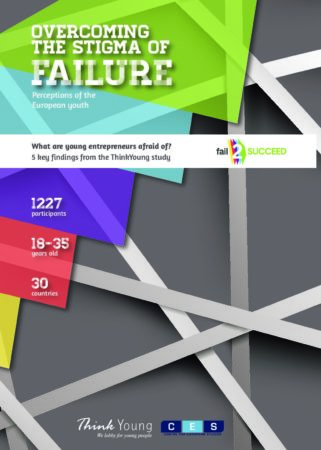
Collaborative
Overcoming the stigma of failure: Perceptions of the European youth
-
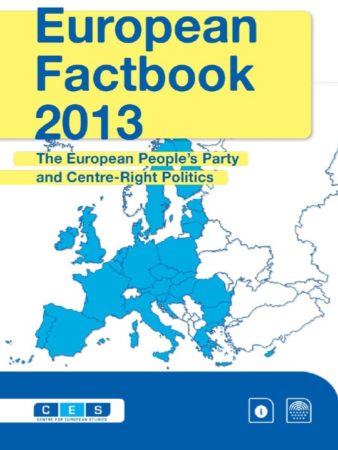
Collaborative
European Factbook 2013: The European People’s Party and Centre Right Politics
-

Research Papers
Getting Georgia Right
-

Collaborative
Teaching the History of Communism – Compendium for history teachers
-

Other
EU Policies: an Overview – From Decision-Making to Implementation
-
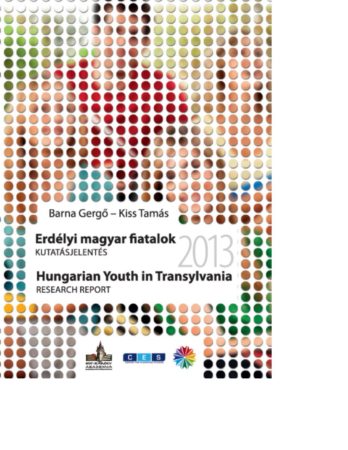
Collaborative
Hungarian Youth in Transylvania: A Research Report
-
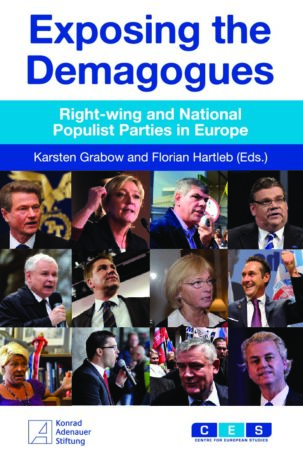
Collaborative
Exposing the Demagogues: Right-wing and National Populist Parties in Europe
-

Policy Briefs
The Muslim Brotherhood after the Arab Spring: Tactics, Challenges and Future Scenarios
-

Research Papers
Breaking Down the Walls: Improving EU–NATO Relations
-
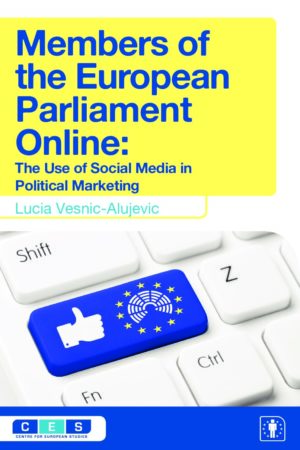
Research Papers
Members of the European Parliament Online: The Use of Social Media in Political Marketing
-
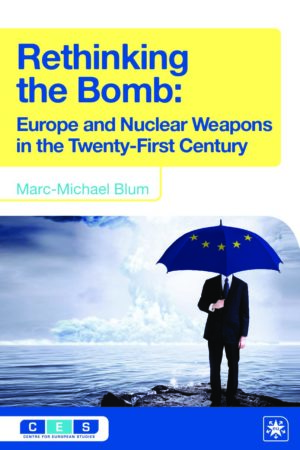
Research Papers
Rethinking the Bomb: Europe and Nuclear Weapons in the Twenty-First Century
-
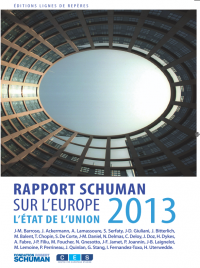
Collaborative
Schuman Report on Europe: State of the Union 2013
-
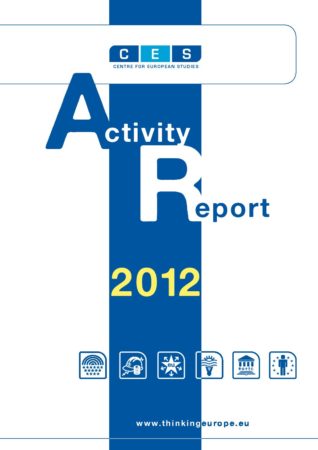
Activity Report
Activity Report 2012
-

Collaborative
Conservative Foreign and Security Policy
-

Collaborative
Social Media and Politics – The New Power of Political Influence
-

Collaborative
Faith and Society: Christian Democratic reflections on the place of religion and ideology in the public domain
-
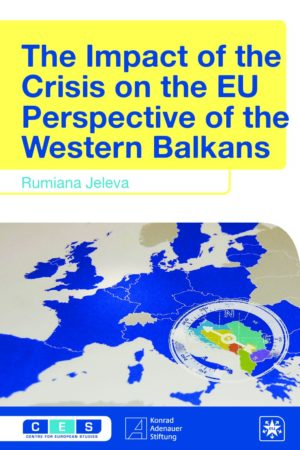
Research Papers
The Impact of the Crisis on the EU Perspective of the Western Balkans
-
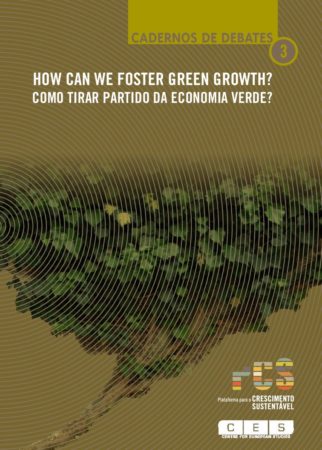
Collaborative
How Can We Foster Green Growth?
-
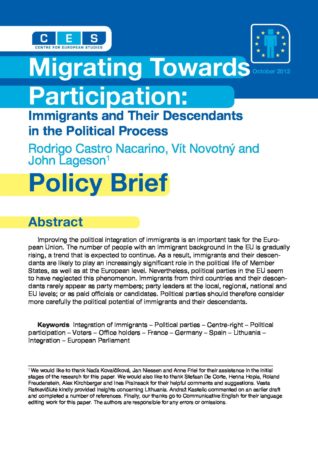
Policy Briefs
Migrating towards Participation: Immigrants and their Descendants in the Political Process
-
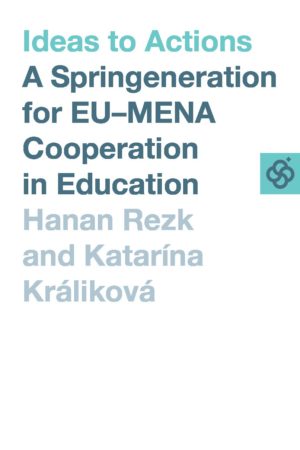
Other
Ideas to Actions: A Springeneration for EU-MENA Cooperation in Education
-
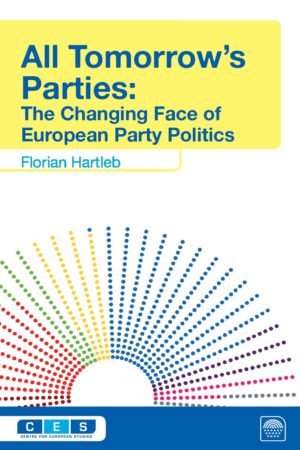
Research Papers
All Tomorrow’s Parties: The Changing Face of European Party Politics
-
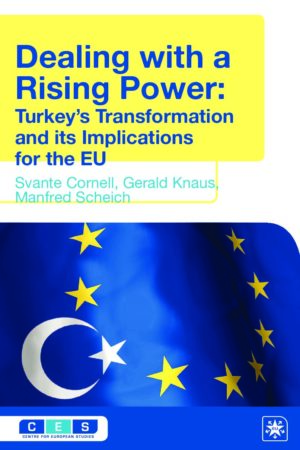
Research Papers
Dealing with a Rising Power: Turkey’s Transformation and its Implications for the EU
-

Research Papers
A Thorn in the Side of European Elites: The New Euroscepticism
-

Research Papers
Contracting out to Private Military and Security Companies
-
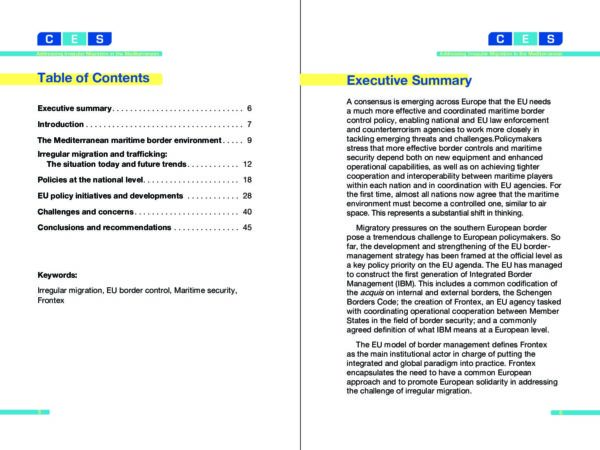
Research Papers
Addressing Irregular Migration in the Mediterranean
-
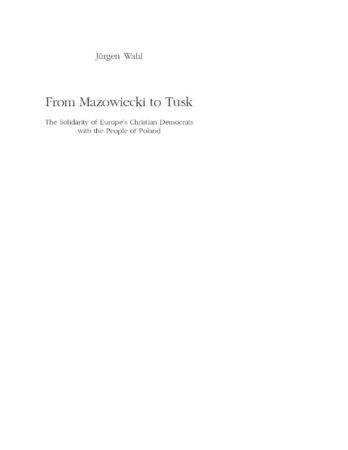
Other
From Mazowiecki to Tusk: The Solidarity of Europe’s Christian Democrats with the People of Poland
-

Research Papers
European Integration of Western Balkans: From Reconciliation To European Future
-
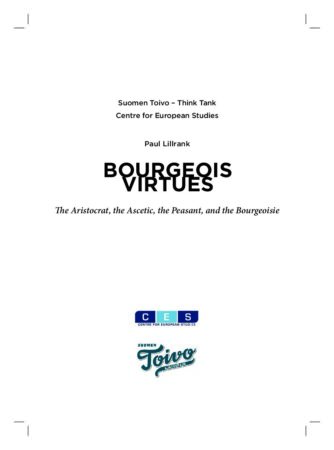
Collaborative
Bourgeois Virtues: the Aristocrat, the Ascetic, the Peasant, and the Bourgeoisie
-
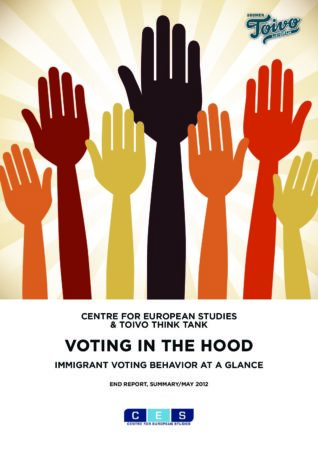
Collaborative
Voting in the Hood
-

Research Papers
Green Energy- Green Business: New Financial and Policy Instruments for Sustainable Growth in the EU
-
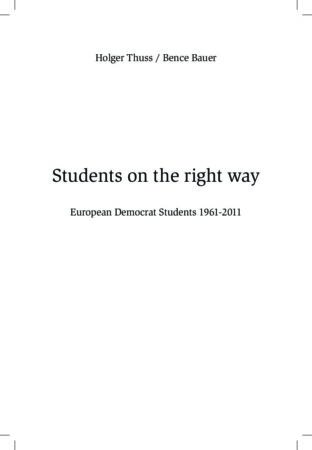
Other
Students on the Right Way: European Democrat Students 1961-2011
-
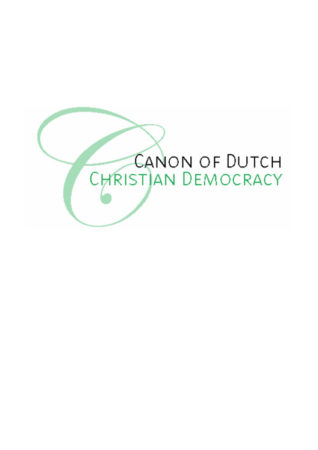
Collaborative
Canon of Dutch Christian Democracy
-
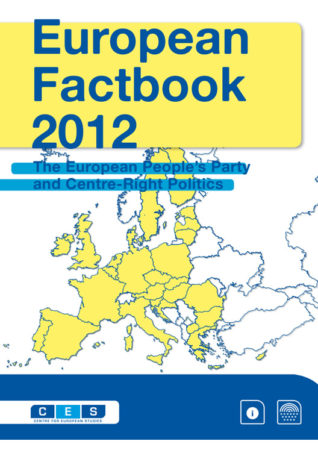
Other
European Factbook 2012
-
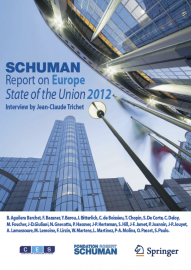
Collaborative
Schuman Report on Europe: State of the Union 2012
-

Research Papers
A Higher Education for the Twenty-first Century: European and US approaches
-
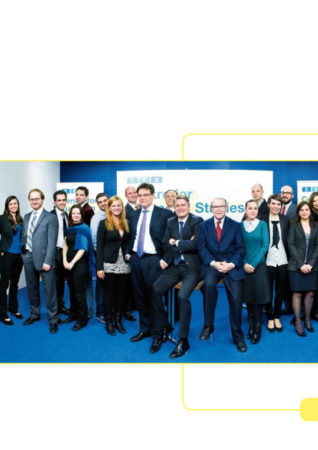
Activity Report
Activity Report 2011
-
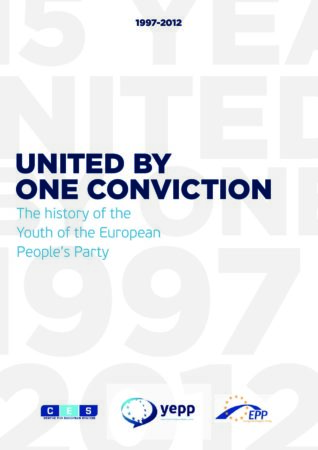
Other
United by one conviction: The history of the Youth of the European People’s Party
-
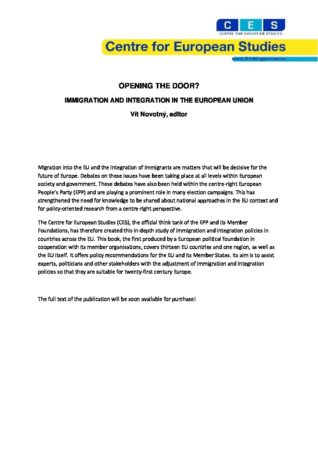
Other
Opening the Door? Immigration and Integration in the European Union
-
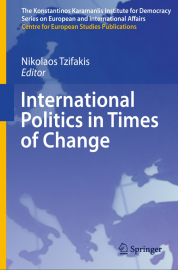
Collaborative
International Politics in Times of Change
-
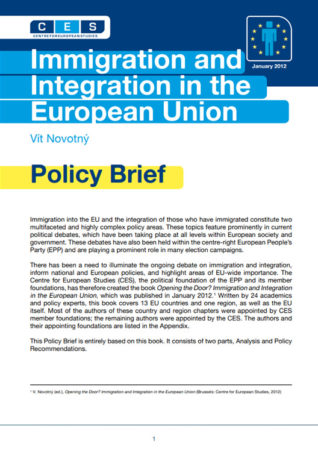
Policy Briefs
Immigration and Integration in the European Union
-
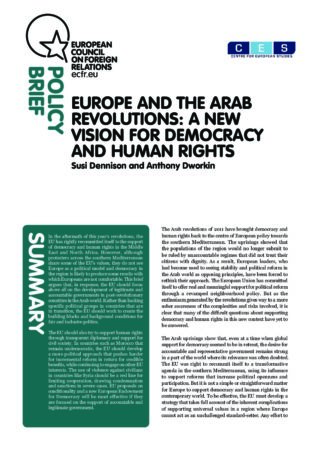
Other
Europe and the Arab Revolutions
-
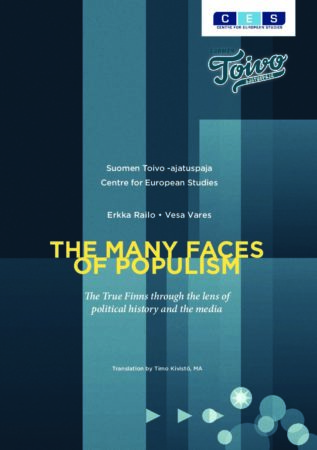
Collaborative
The Many Faces of Populism: The True Finns through the lens of political history and the media
-

Collaborative
The Many Faces of Conservatism: The Essence, History and Future of Conservative Thought
-

Other
Europa: Lluitar, Sobreviure
-
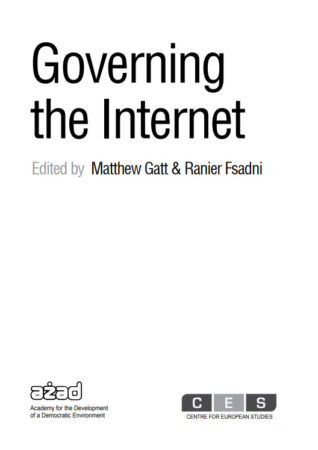
Collaborative
Governing the Internet
-
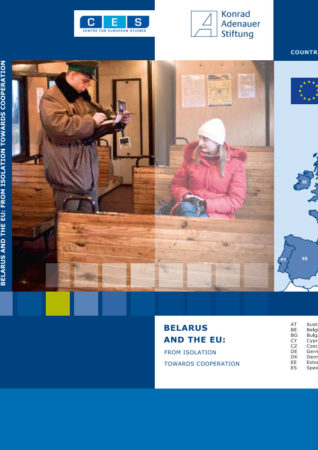
Collaborative
Belarus and the EU: from Isolation towards Cooperation
-

Research Papers
After Their Establishment: Right-wing Populist Parties in Europe
-
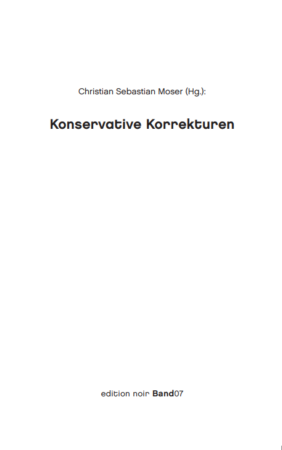
Other
Conservative Corrections
-
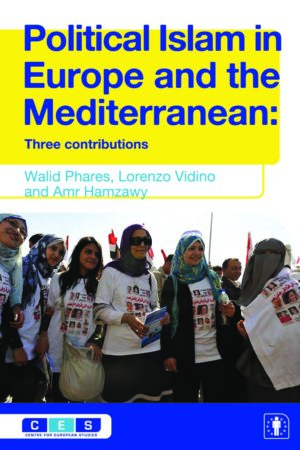
Research Papers
Political Islam in Europe and the Mediterranean: Three contributions
-
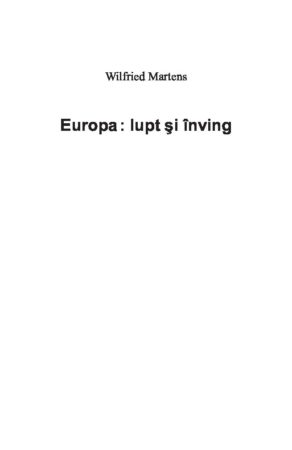
Other
Europa : lupt şi înving
-
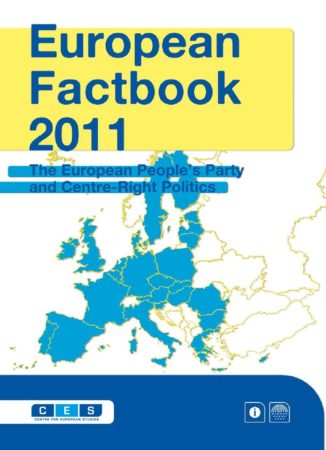
Other
European Factbook 2011
-

Collaborative
Voting Far Away: Expats Exercising Political Rights Abroad
-
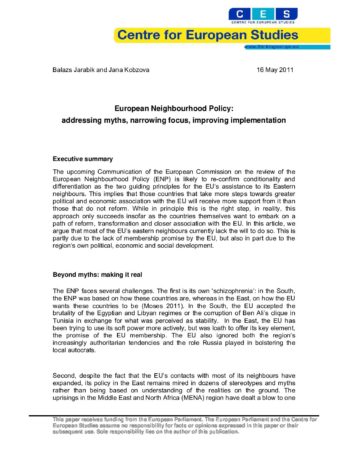
Other
European Neighbourhood Policy: Addressing Myths, Narrowing Focus, Improving Implementation
-
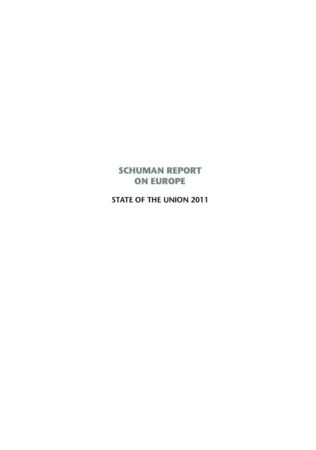
Collaborative
Schuman Report on Europe: State of the Union 2011
-
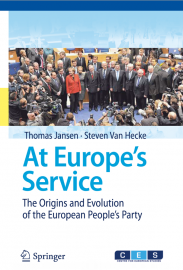
Other
At Europe’s Service: The Origins and Evolution of the European People’s Party
-
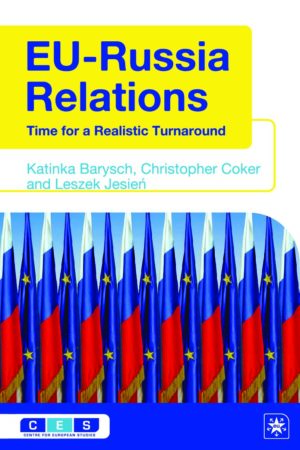
Research Papers
EU-Russia Relations: Time for a realistic turnaround
-

Research Papers
Old Ghosts in New Sheets: European Populist Parties and Foreign Policy
-

Activity Report
CES Activity Report 2010
-
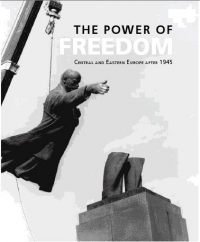
Other
The Power of Freedom: Central and Eastern Europe after 1945
-
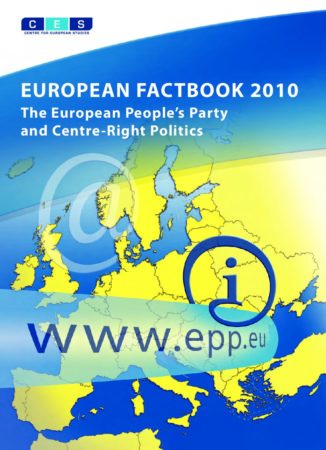
Other
European Factbook 2010
-
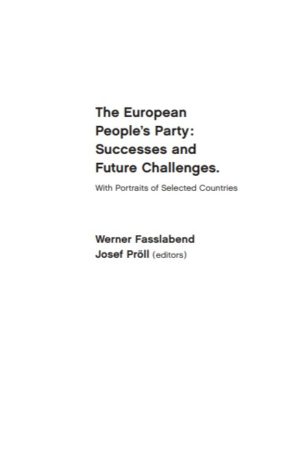
Collaborative
The European People’s Party: Successes and Future Challenges
-
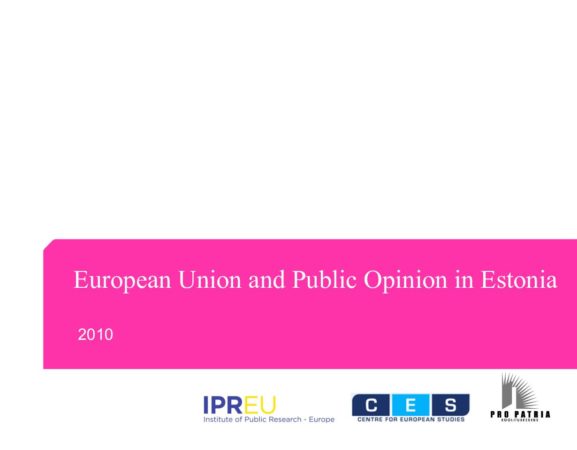
Collaborative
European Union and Public Opinion in Estonia
-
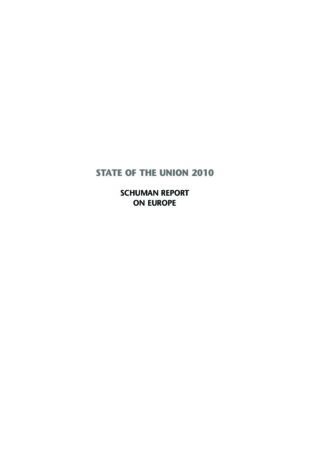
Collaborative
Schuman Report on Europe: State of the Union 2010
-
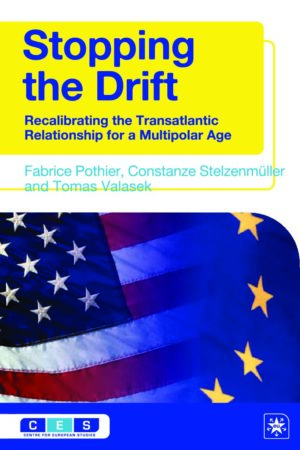
Research Papers
Stopping the Drift: Recalibrating the Transatlantic Relationship for a Multipolar World
-

Research Papers
Dialogue with Islam: Facing the Challenge of Muslim Integration in France, Netherlands and Germany
-
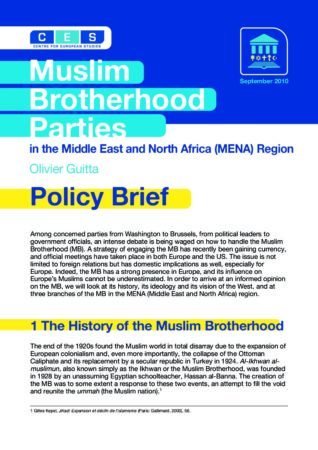
Policy Briefs
Muslim Brotherhood Parties in the Middle East and North Africa (MENA) Region
-
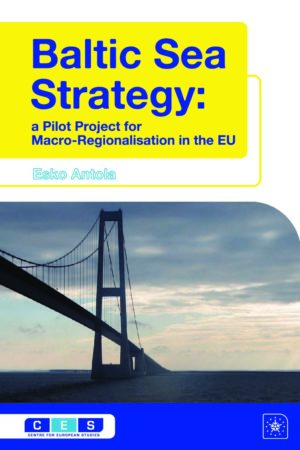
Research Papers
Baltic Sea Strategy a Pilot Project for Macro-Regionalisation in the EU
-
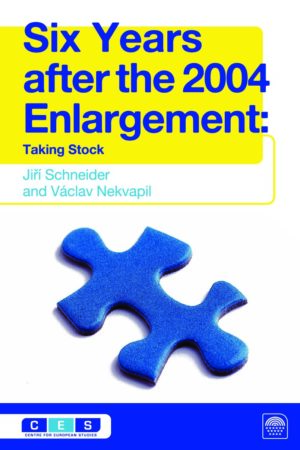
Research Papers
Six Years after the 2004 Enlargement: Taking Stock
-
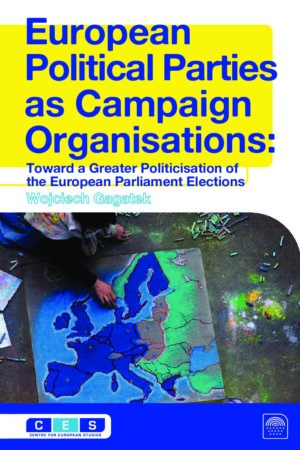
Research Papers
European Political Parties as Campaign Organisations: Towards a Greater Politicization of the European Parliament Elections
-
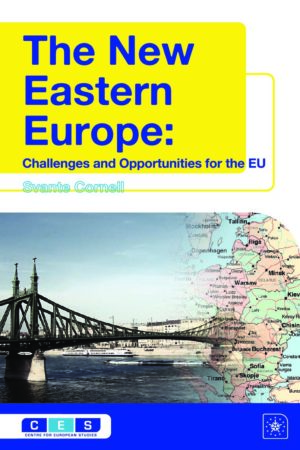
Research Papers
The New Eastern Europe: Challenges and Opportunities for the EU
-
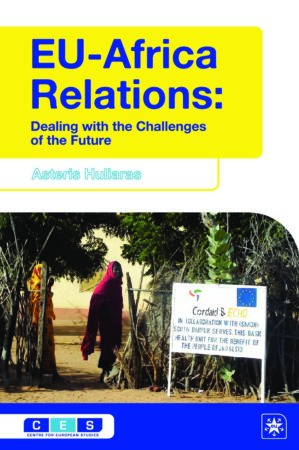
Research Papers
EU-Africa Relations: Dealing With the Challenges of the Future
-
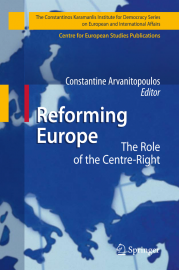
Collaborative
Reforming Europe: The Role of the Centre-Right
-
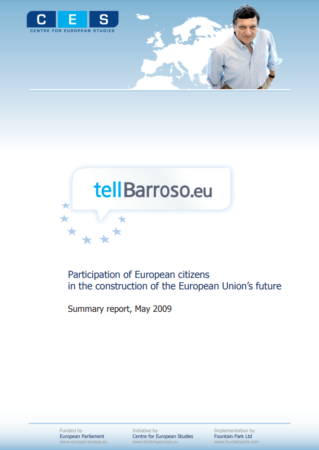
Other
Tell Barroso
-
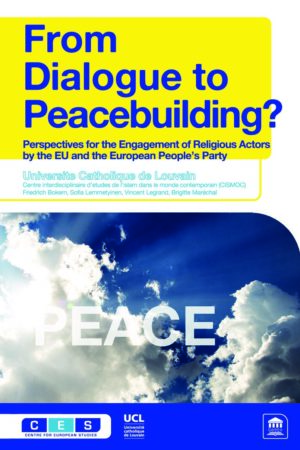
Research Papers
From Dialogue to Peacebuilding? Perspectives for the Engagement of Religious Actors by the EU and the EPP
-
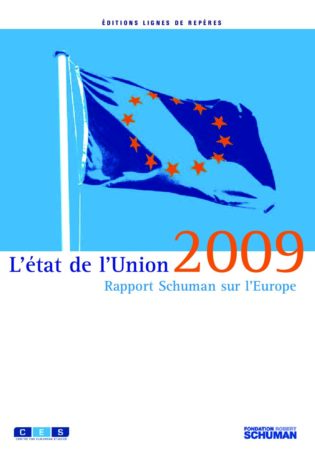
Collaborative
Schuman Report on Europe: State of the Union 2009
-
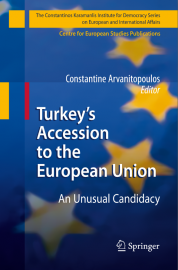
Collaborative
Turkey’s Accession to the European Union: An Unusual Candidacy
-

Research Papers
Accelerating the Deployment of Distributed Renewable Energy: Through Innovative Market-Driven Policy Programs
-

Research Papers
Squaring the Circle? EU-Israel Relations and the Peace Process in the Middle East
-

Collaborative
Man, where are you? An exploration of the Christian Democratic portrayal of mankind
-

Collaborative
Jozsef Antall: Selected Speeches and Interviews (1989-1993)
-
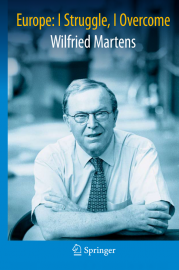
Other
Europe: I Struggle, I Overcome
-

Collaborative
Crossing bridges – Democratisation in the Middle East and a Christian Democratic Approach
-
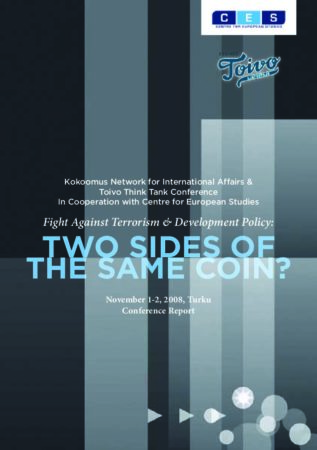
Collaborative
Fight against terrorism and Development Policy: Two Sides of the Same Coin
-
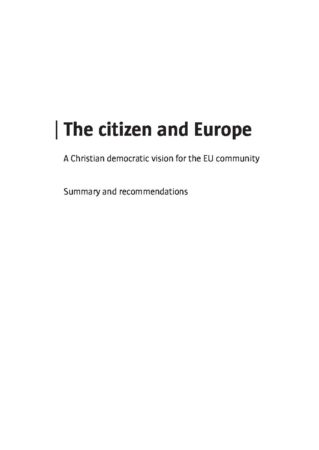
Collaborative
The citizen and Europe – A Christian democratic vision for the EU community
-
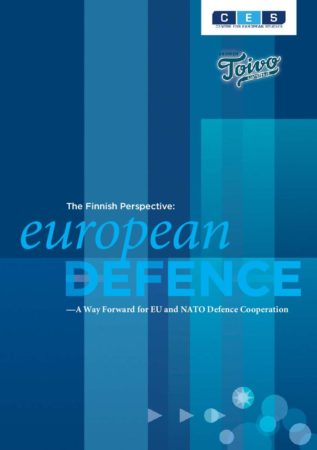
Collaborative
The Finnish Perspective: European Defence


